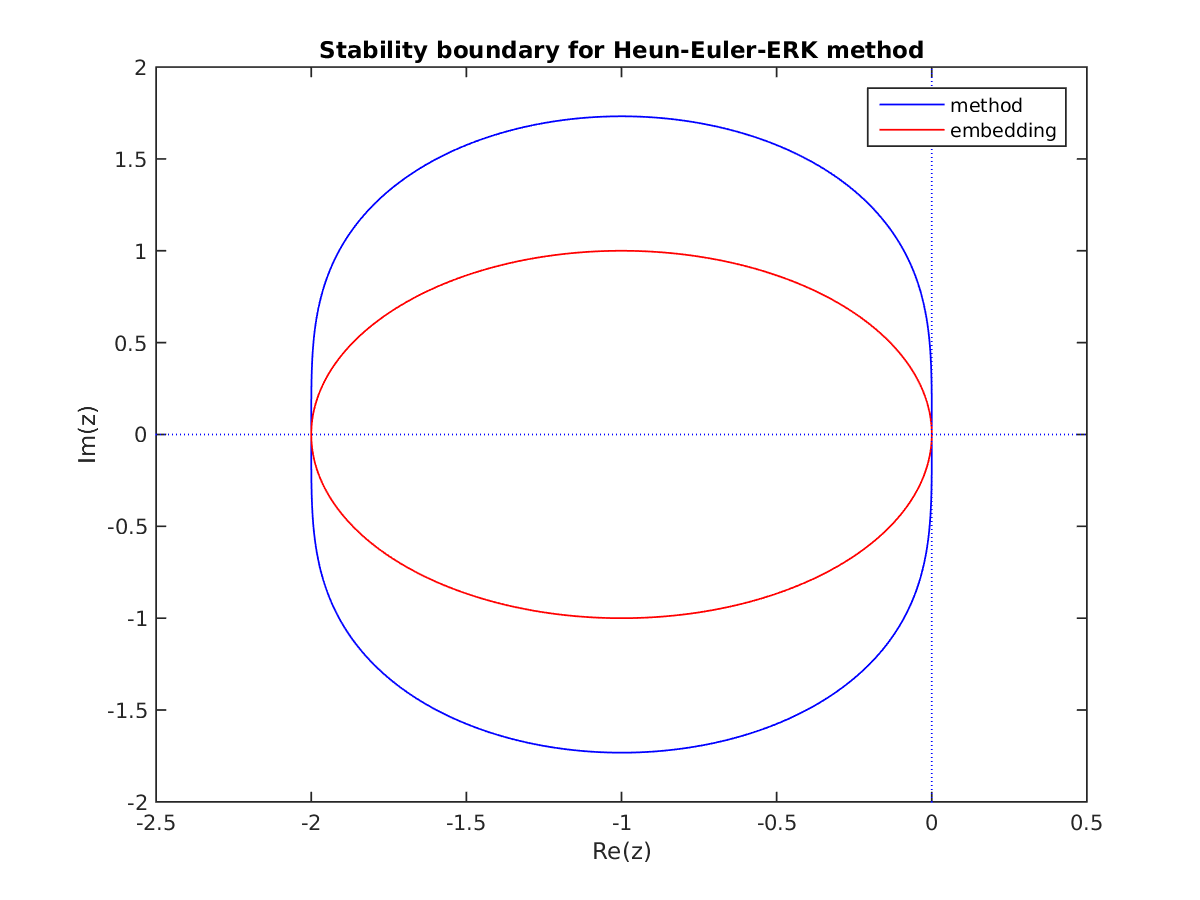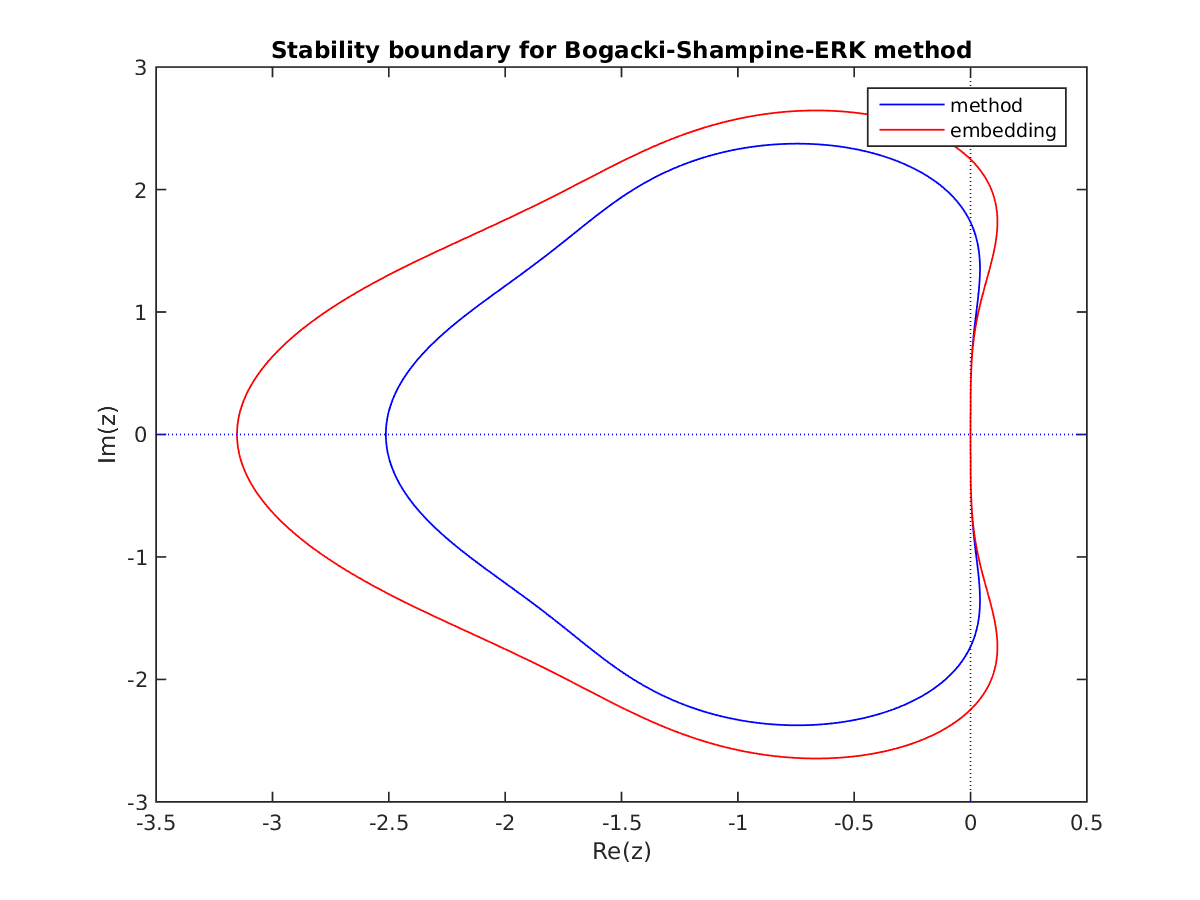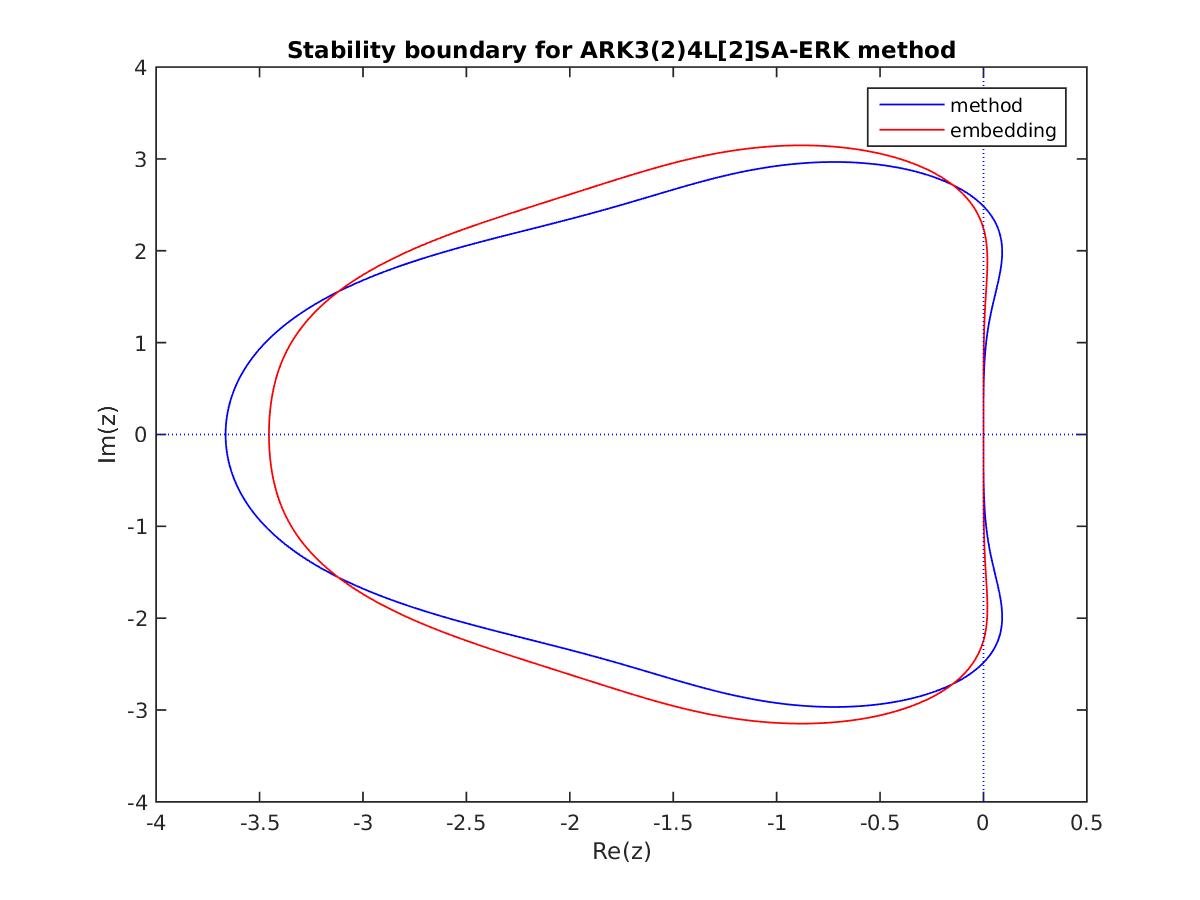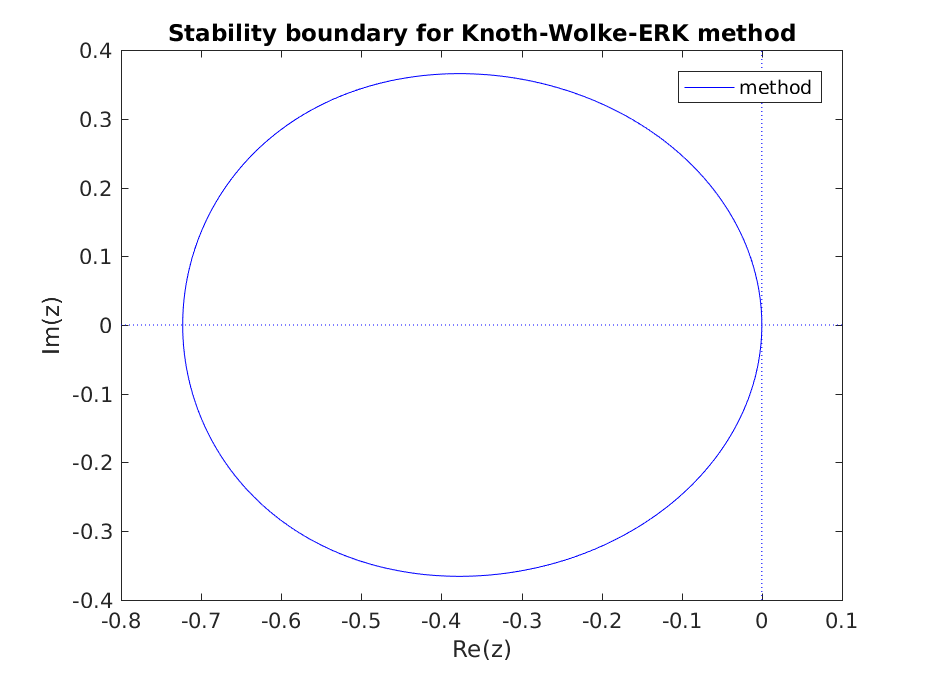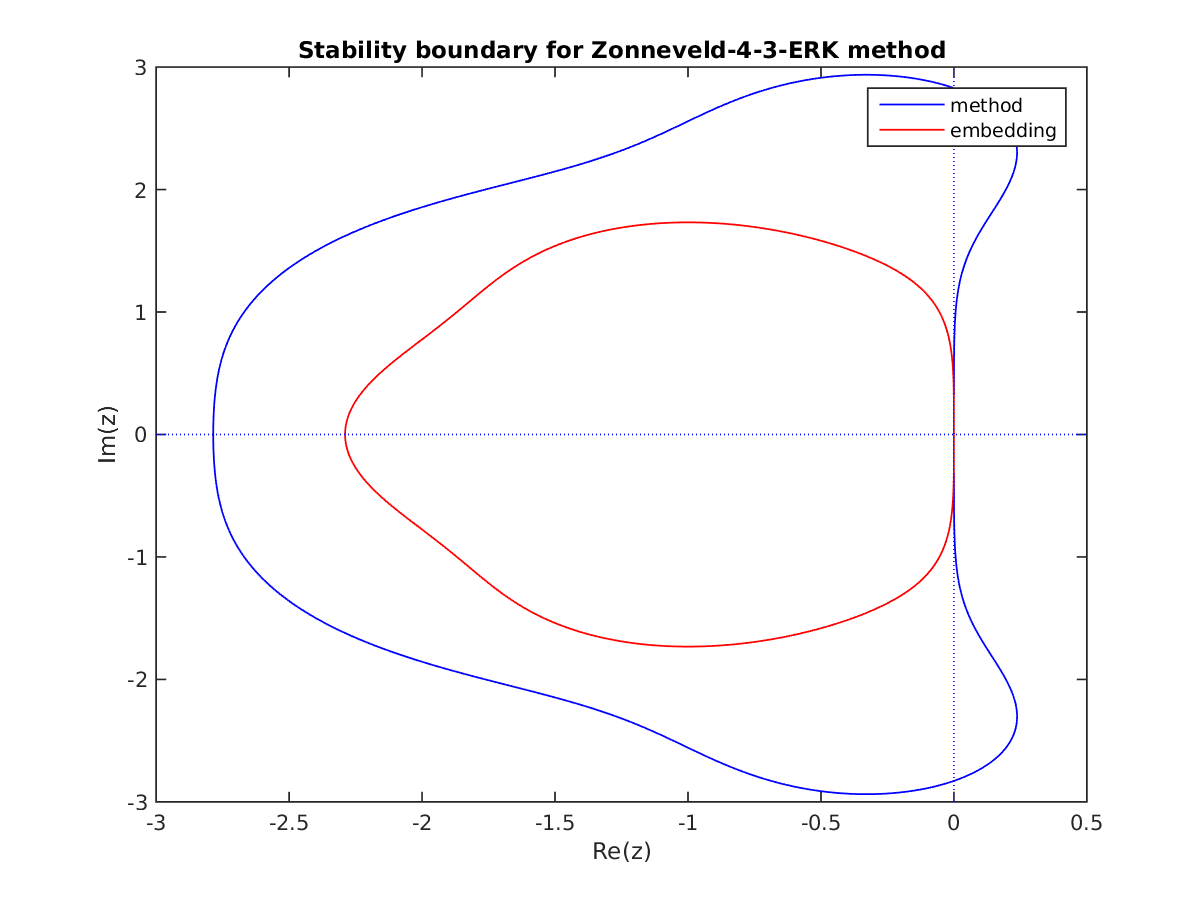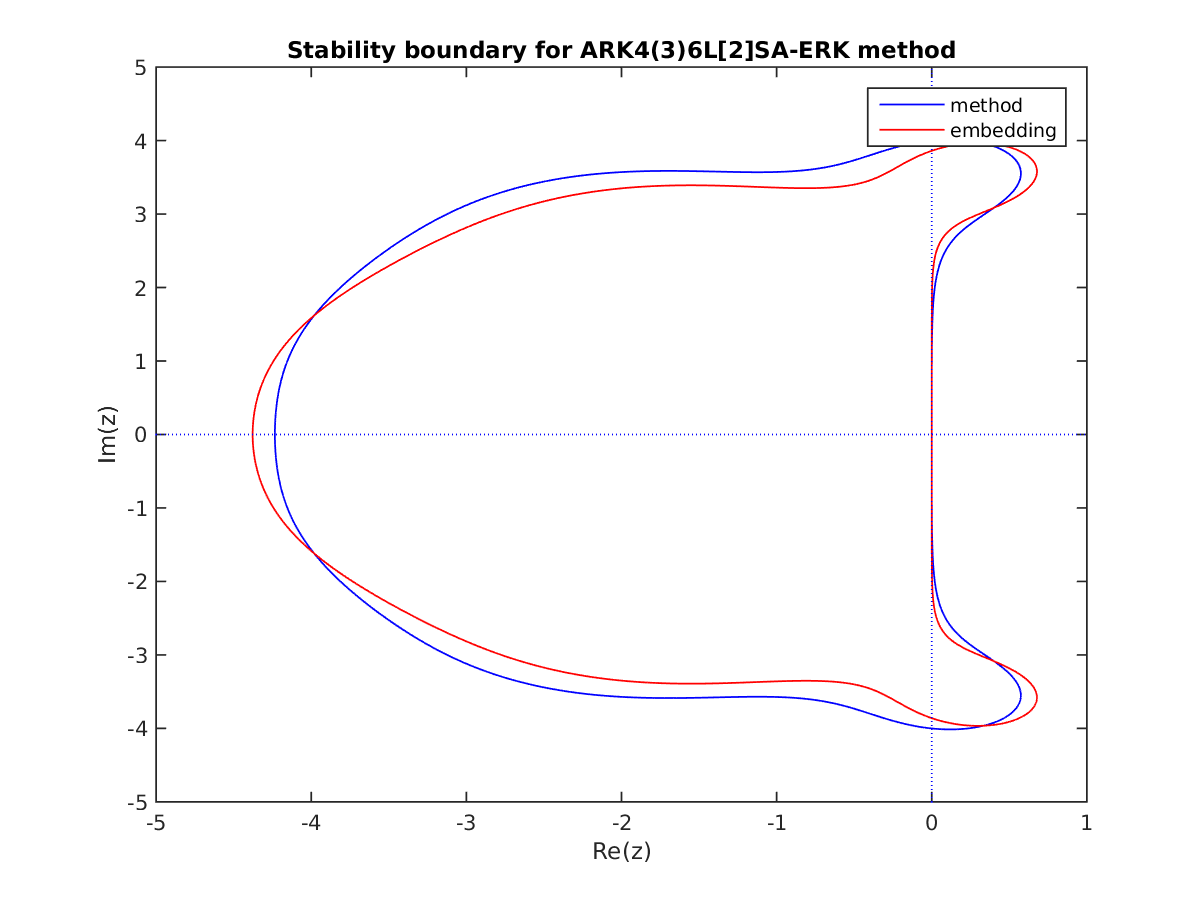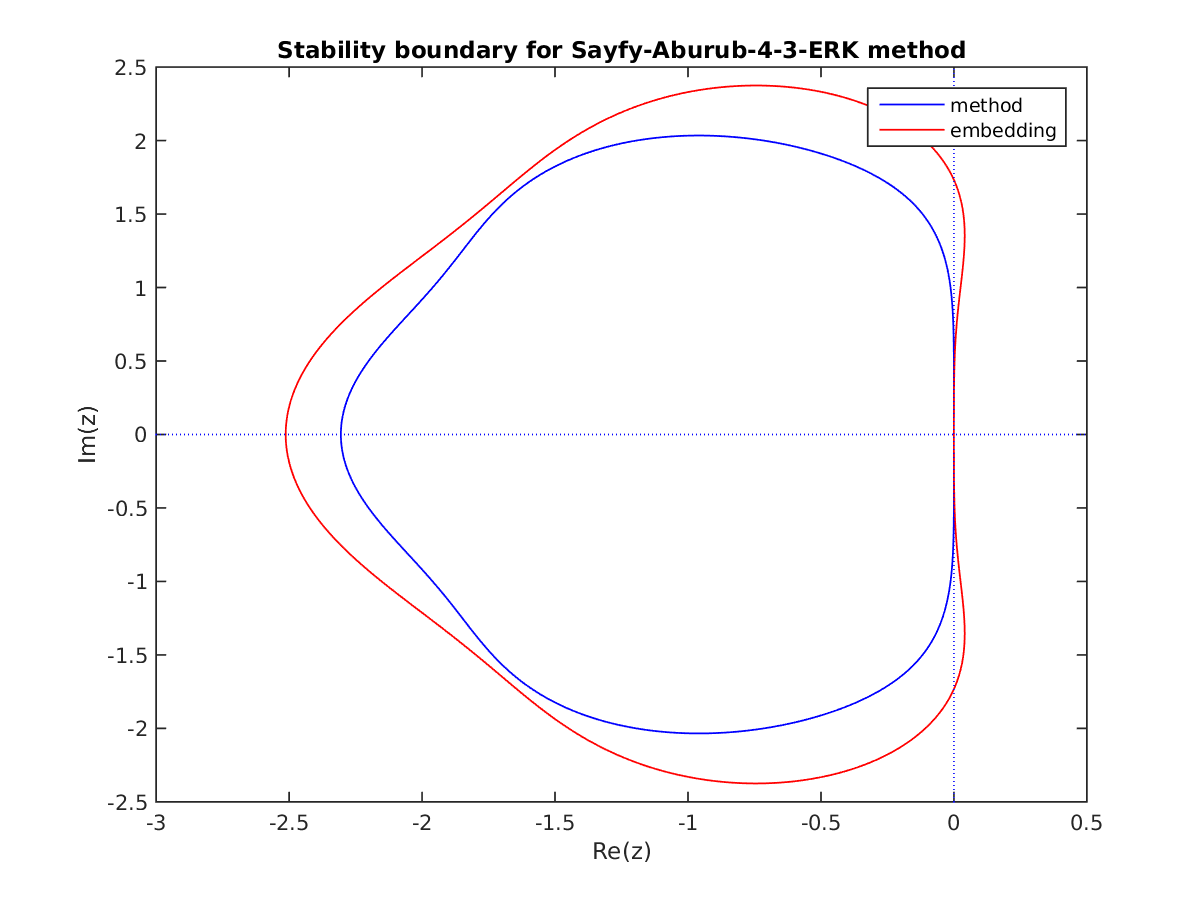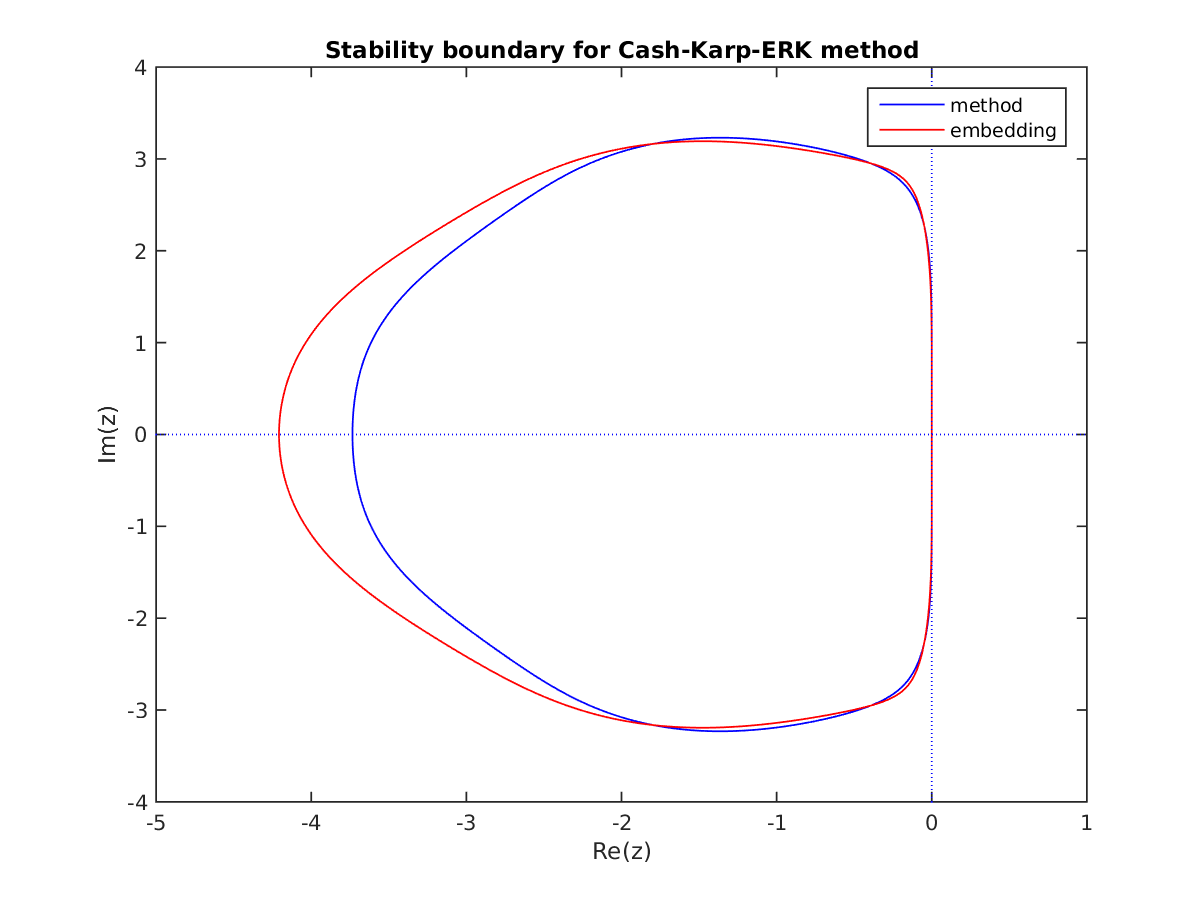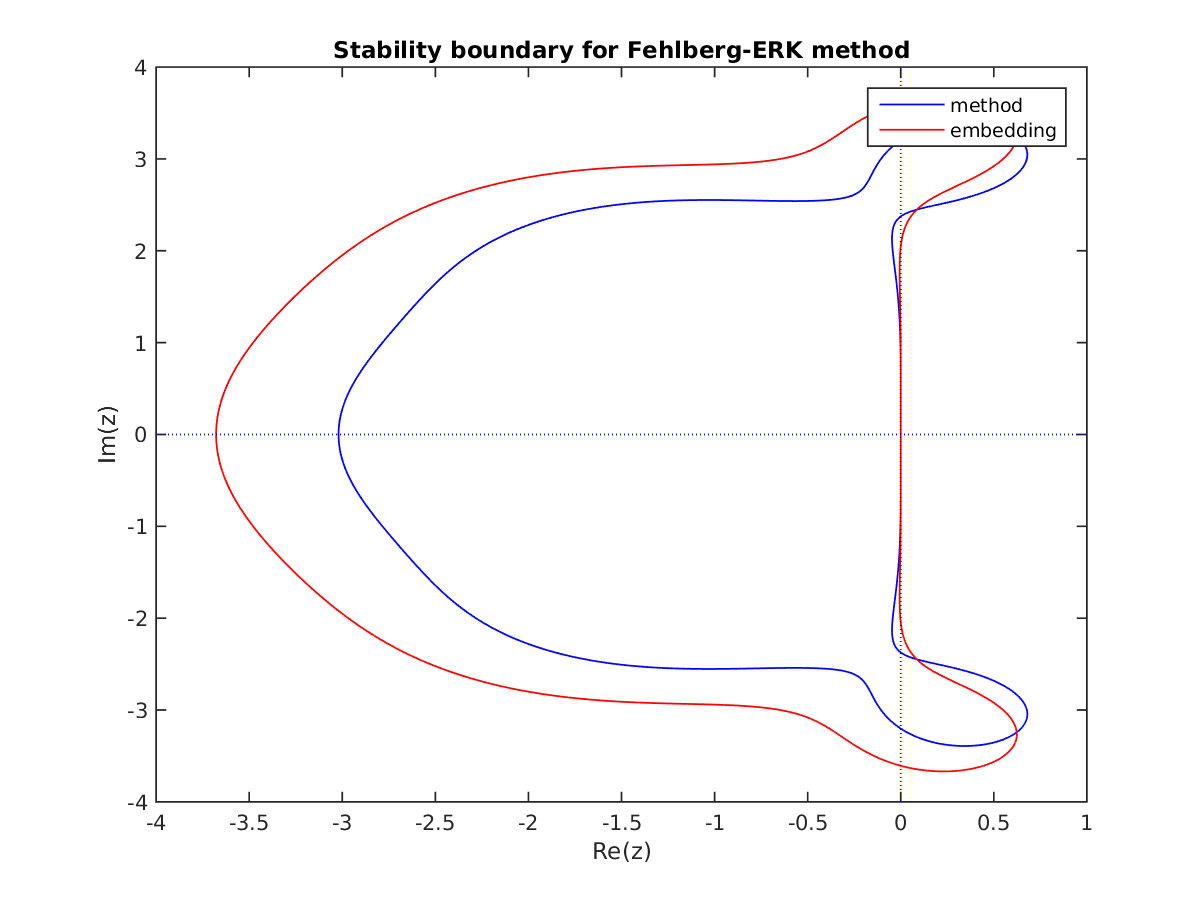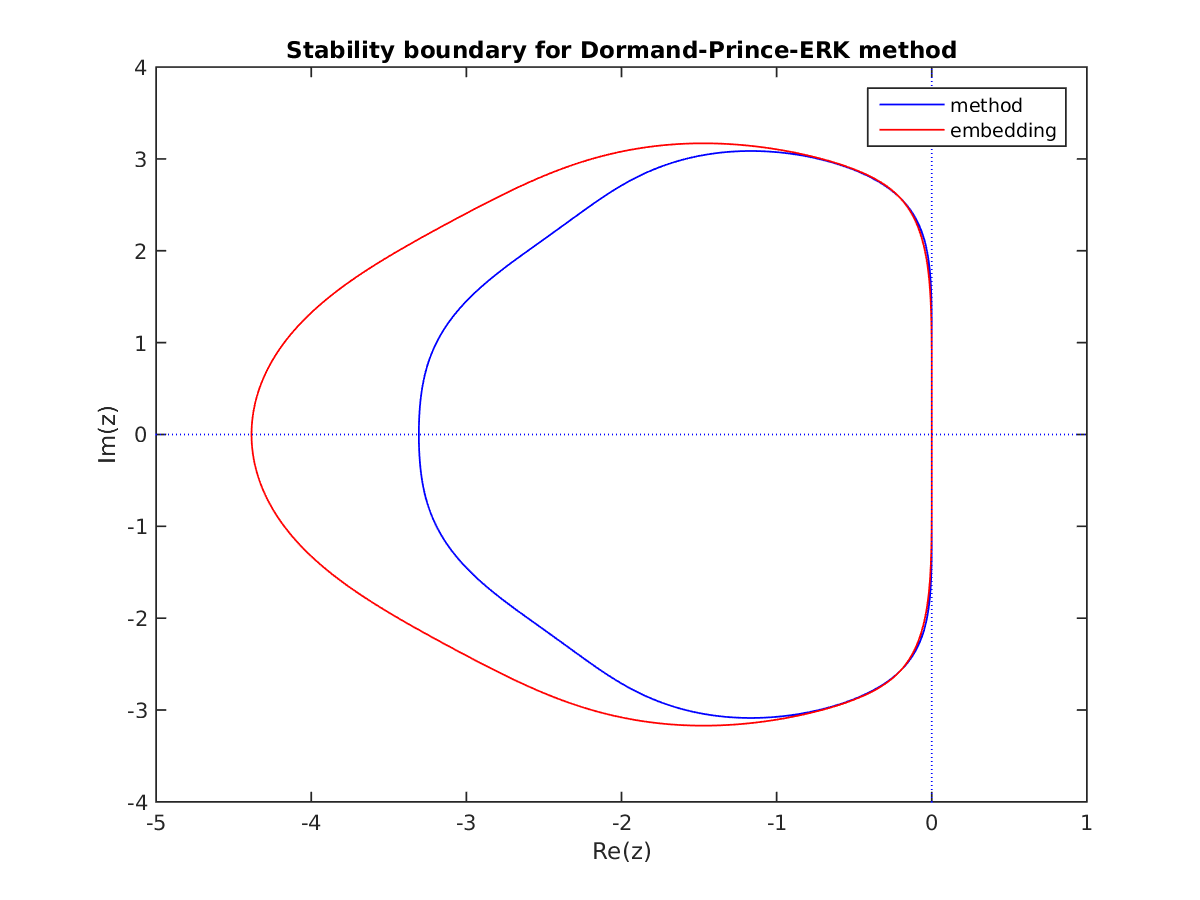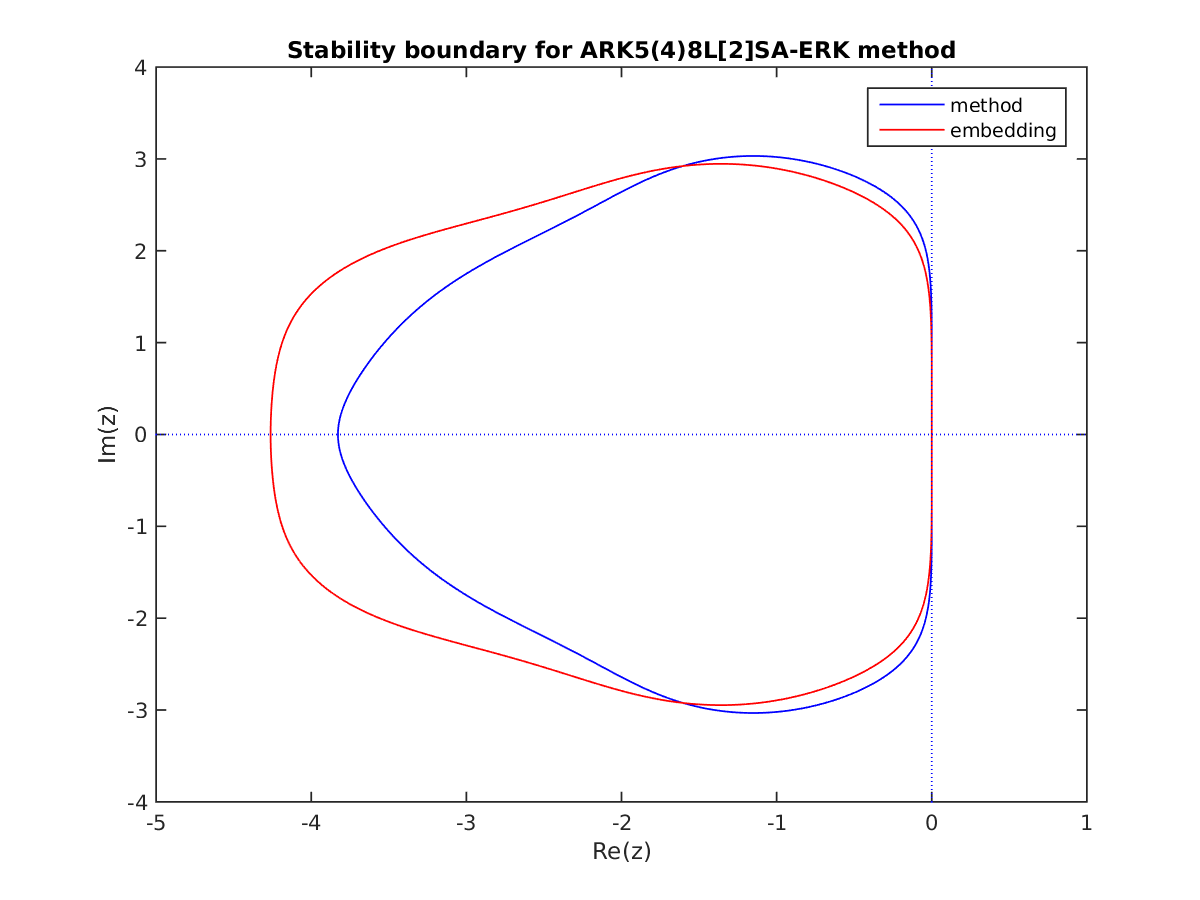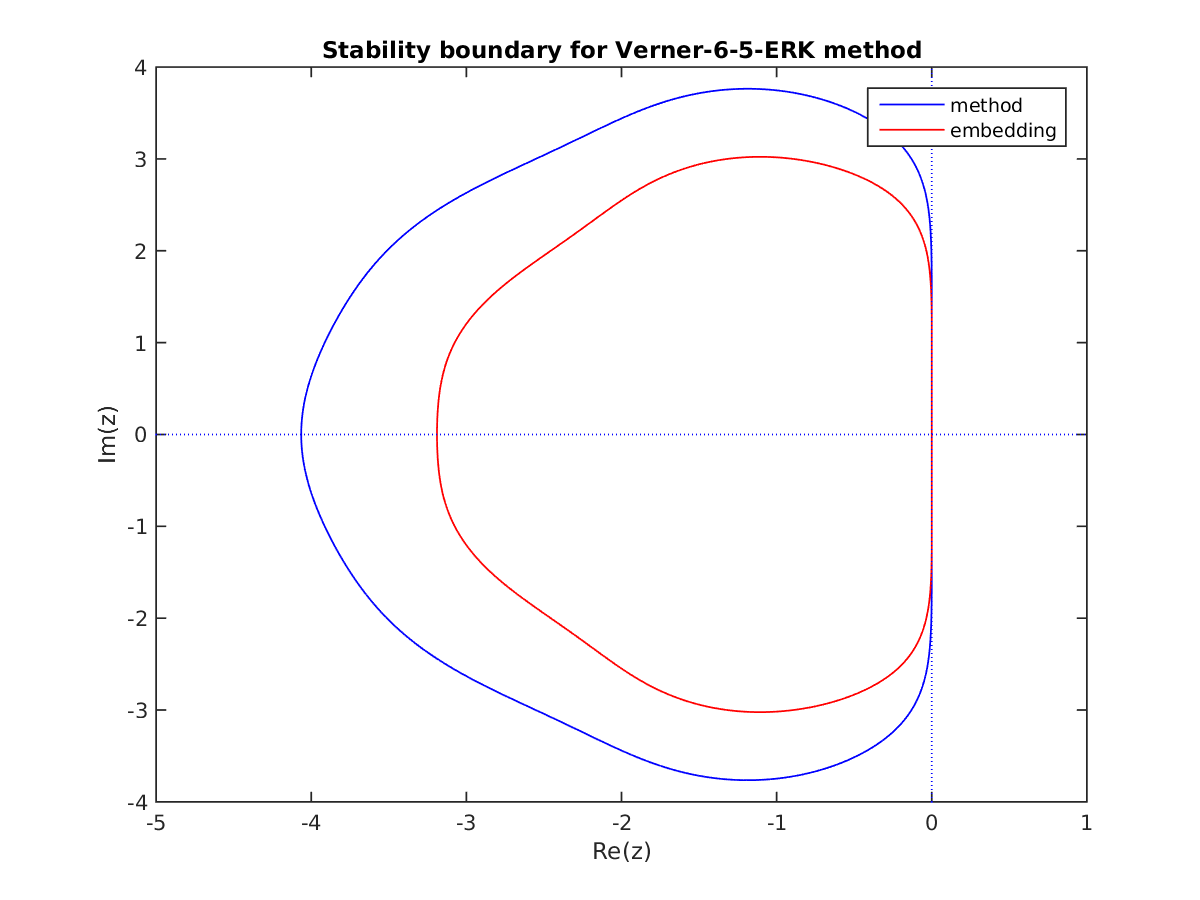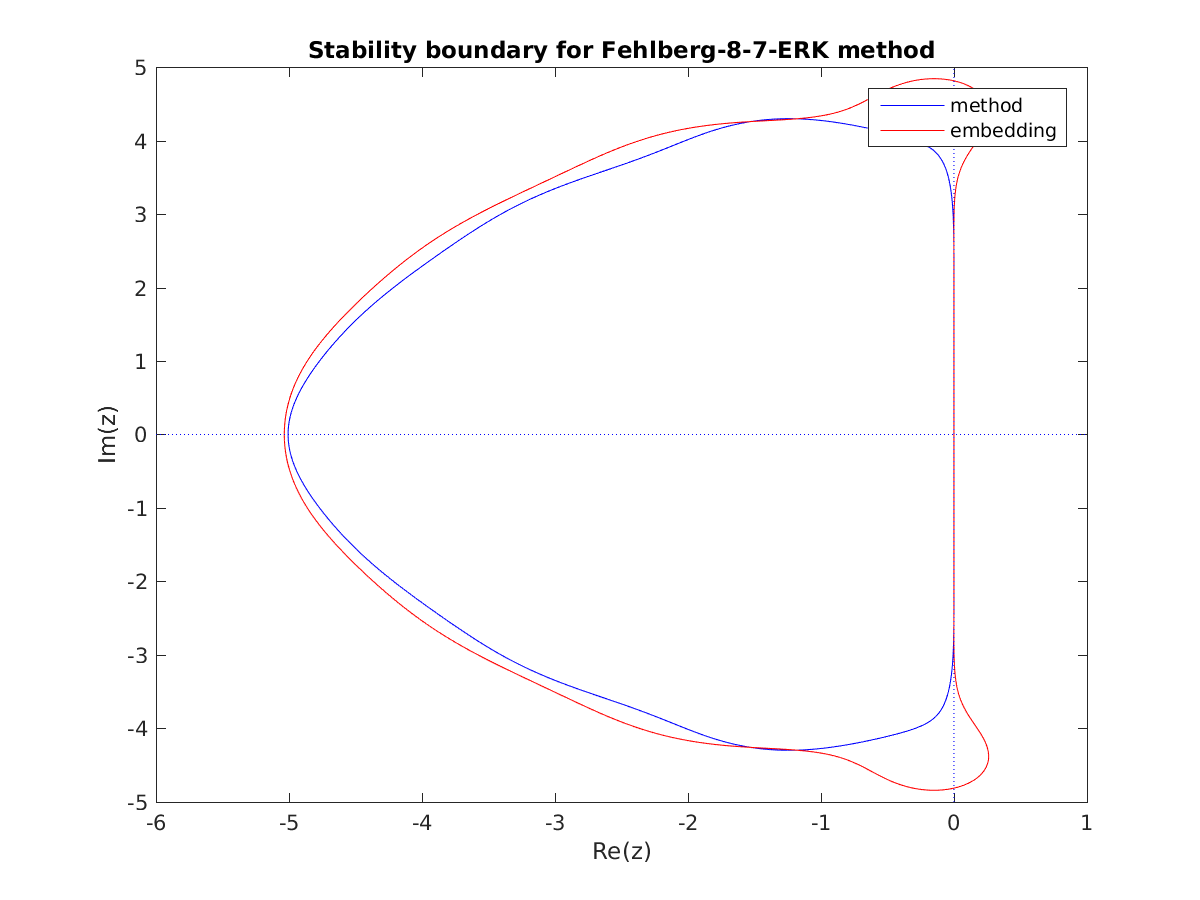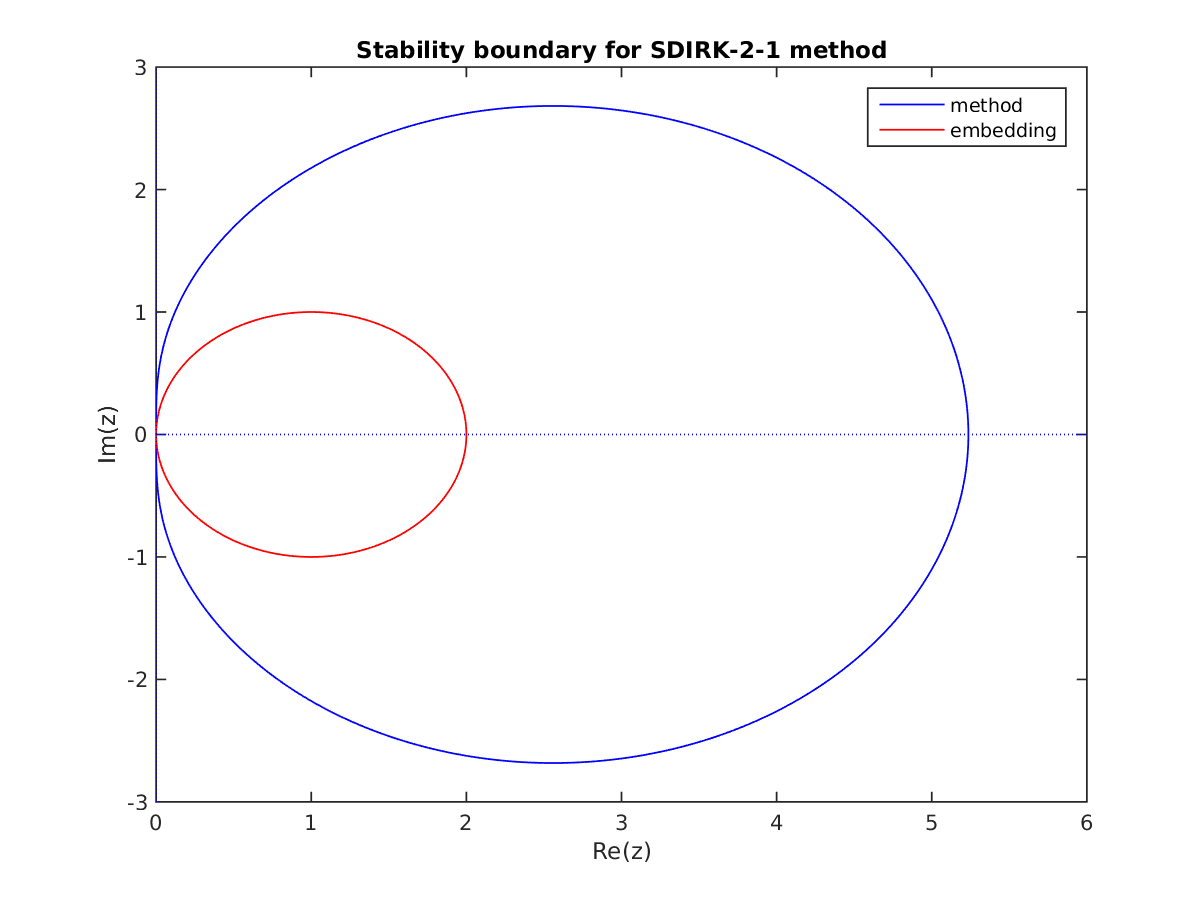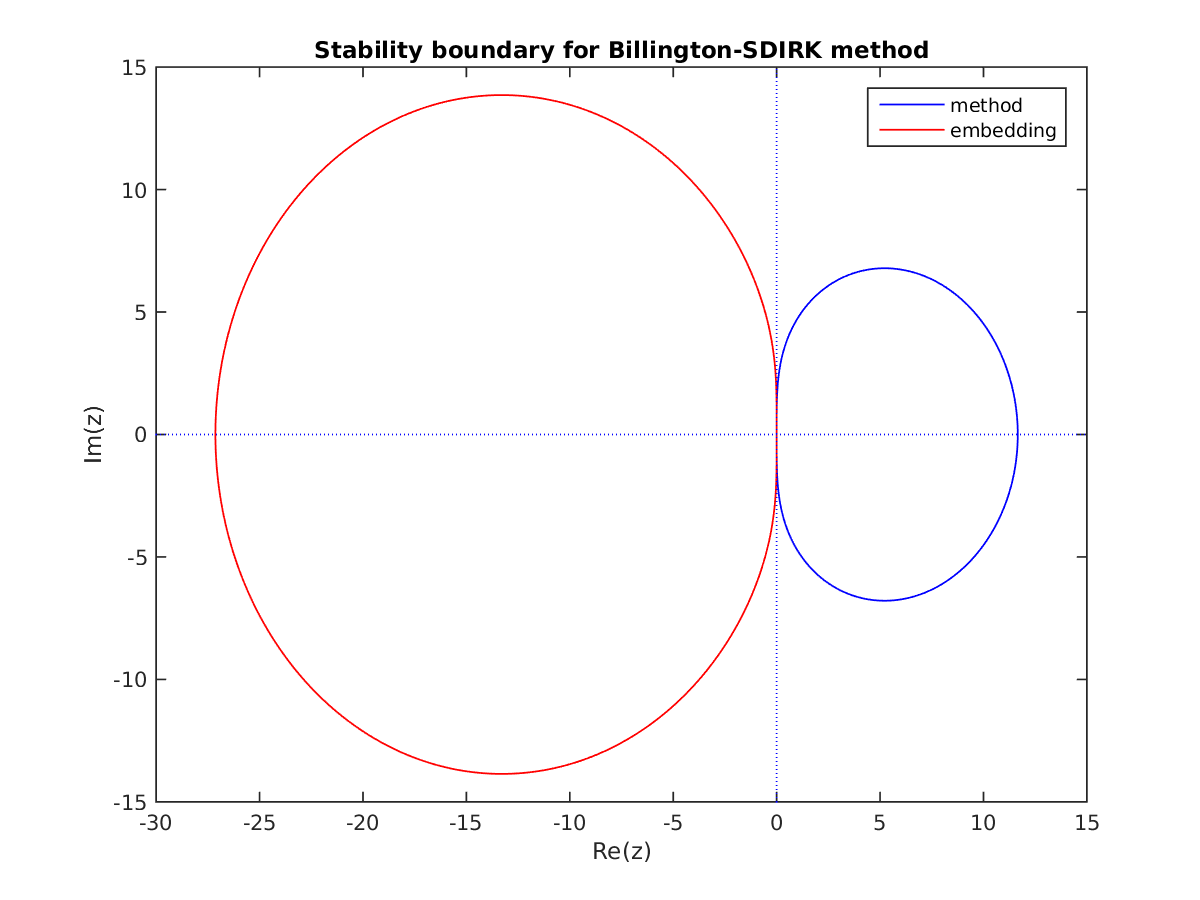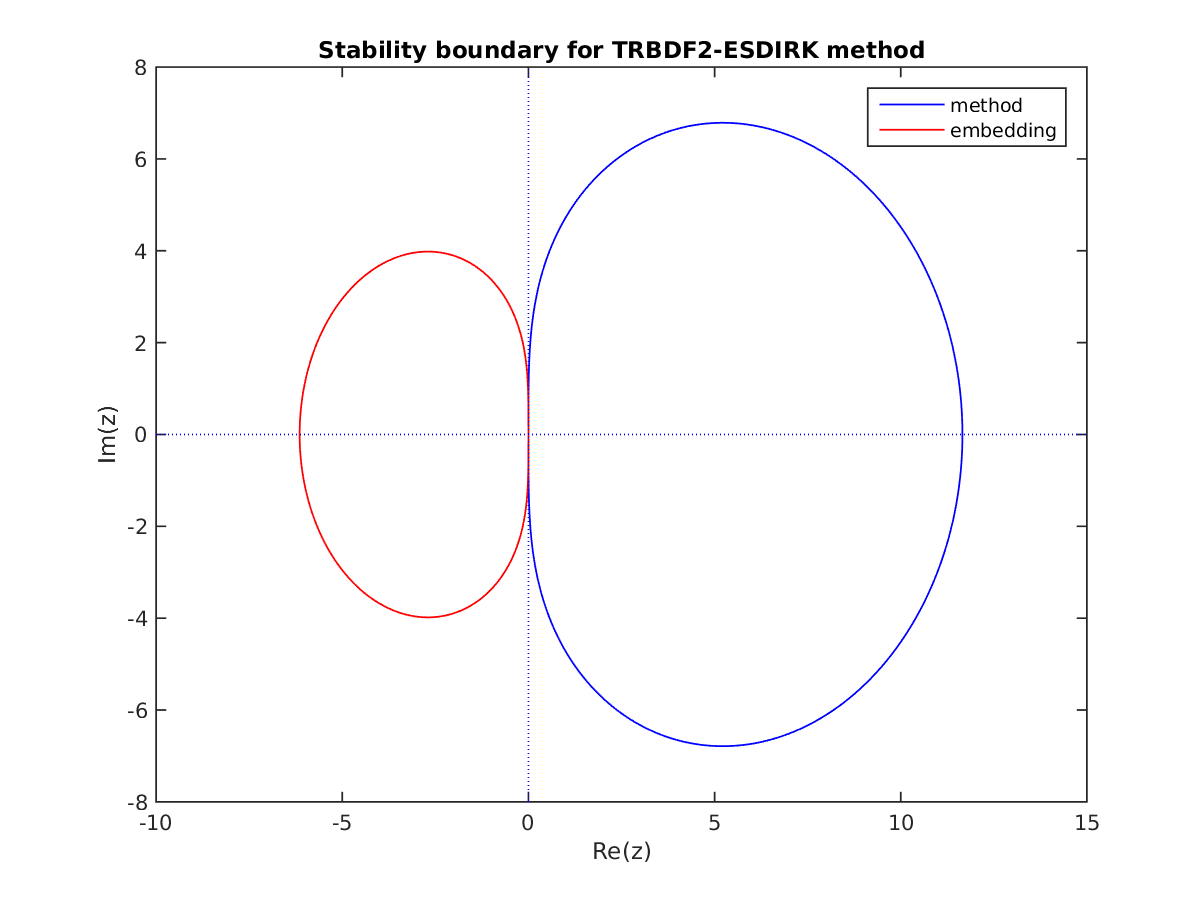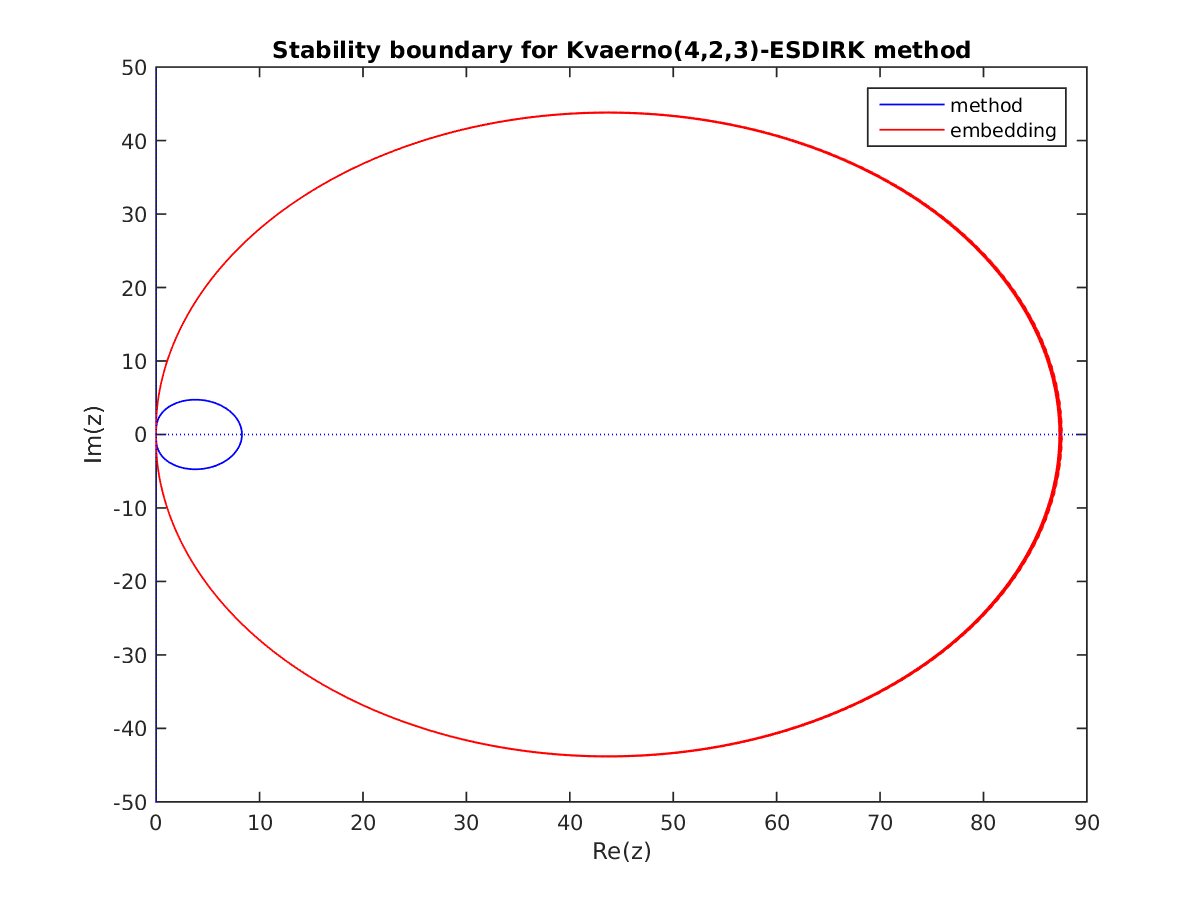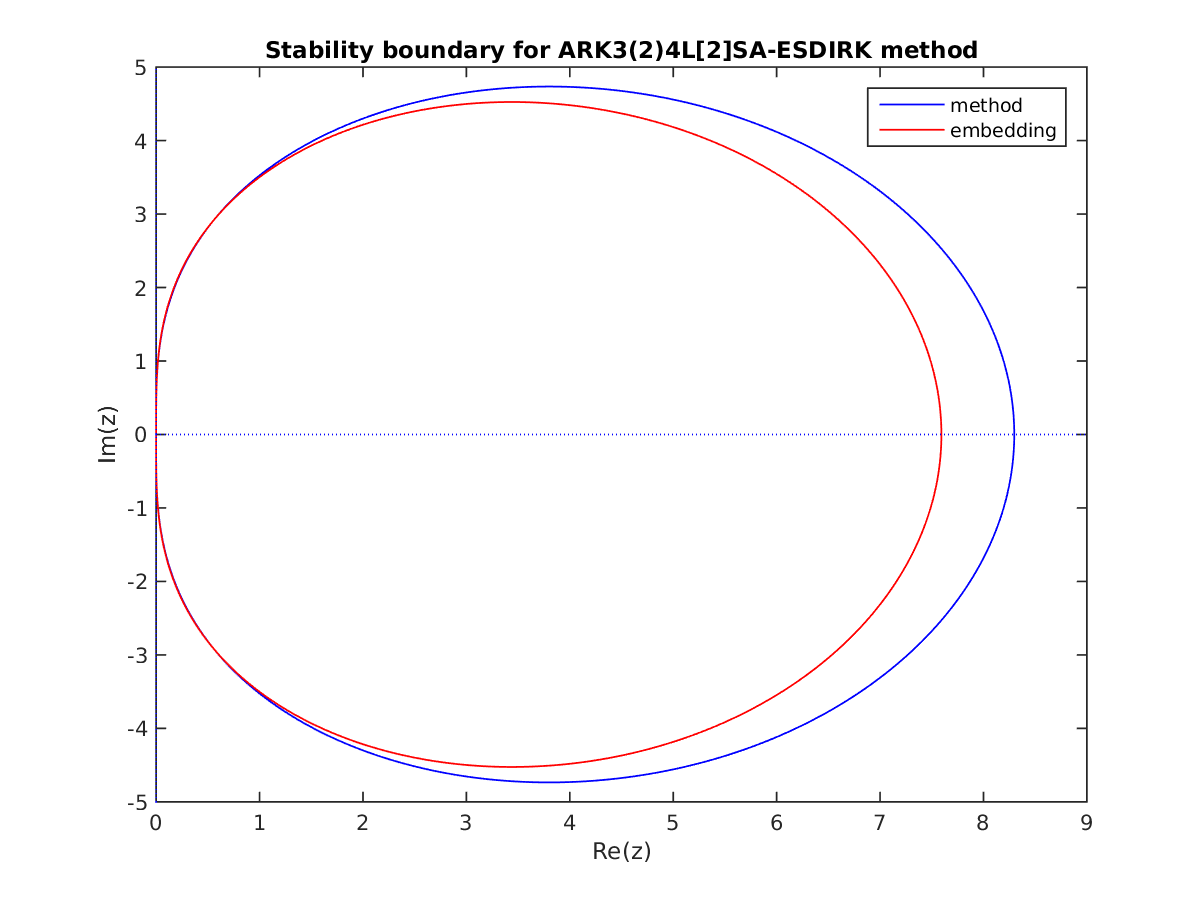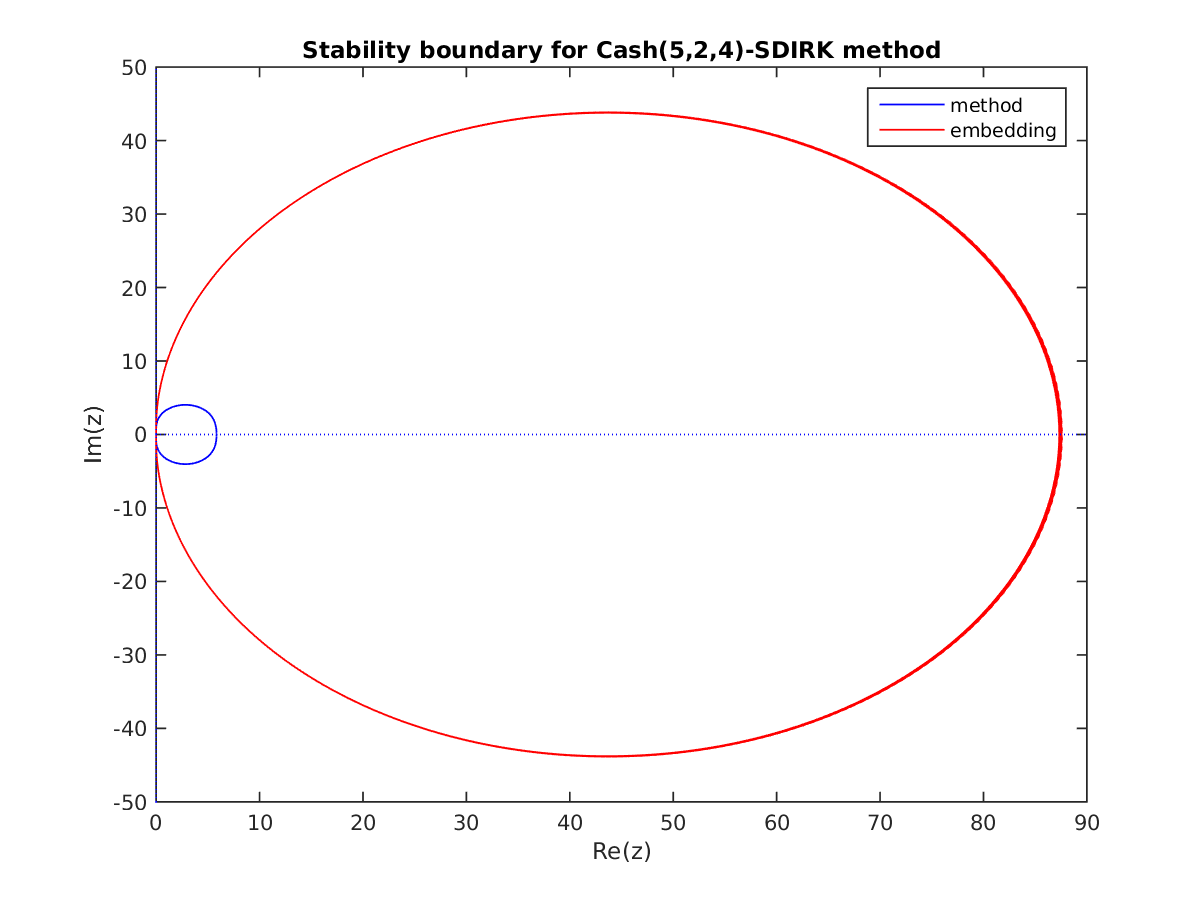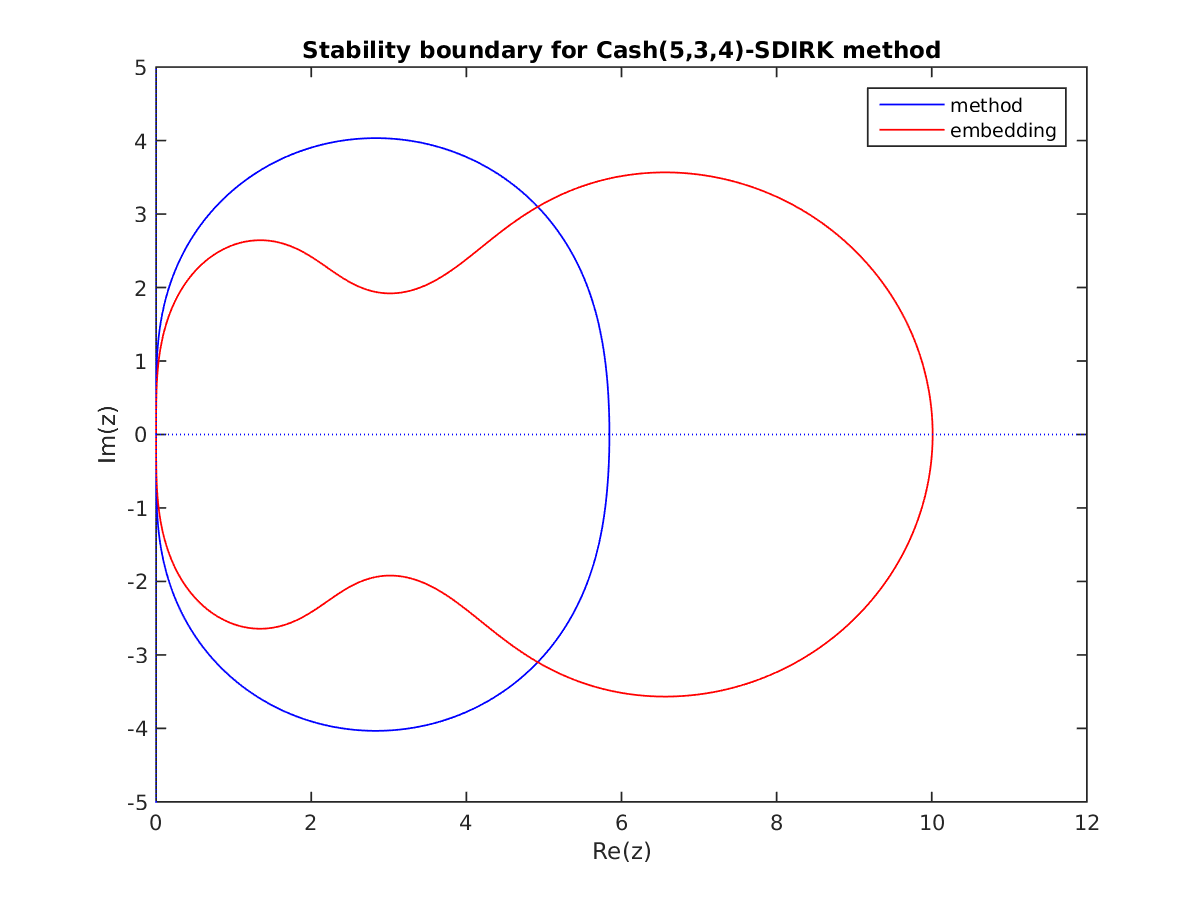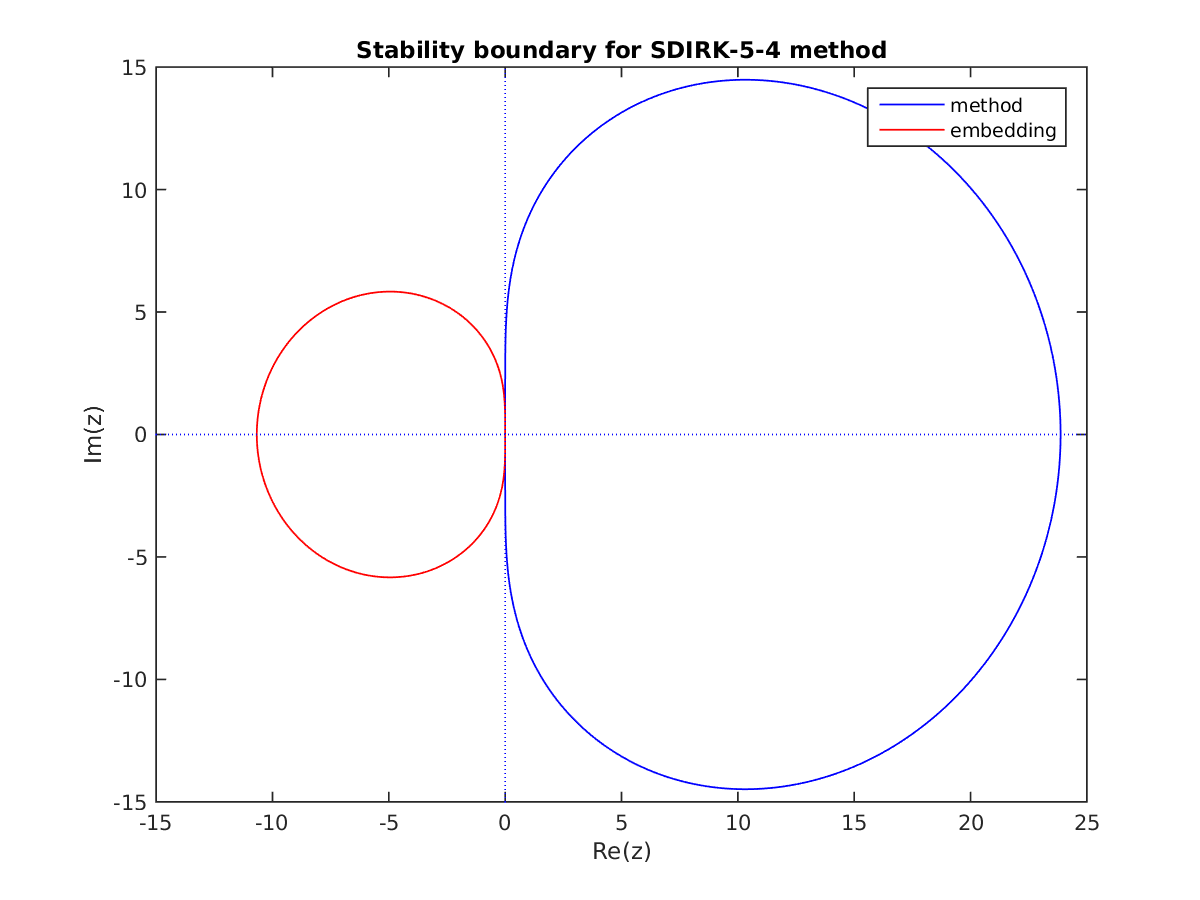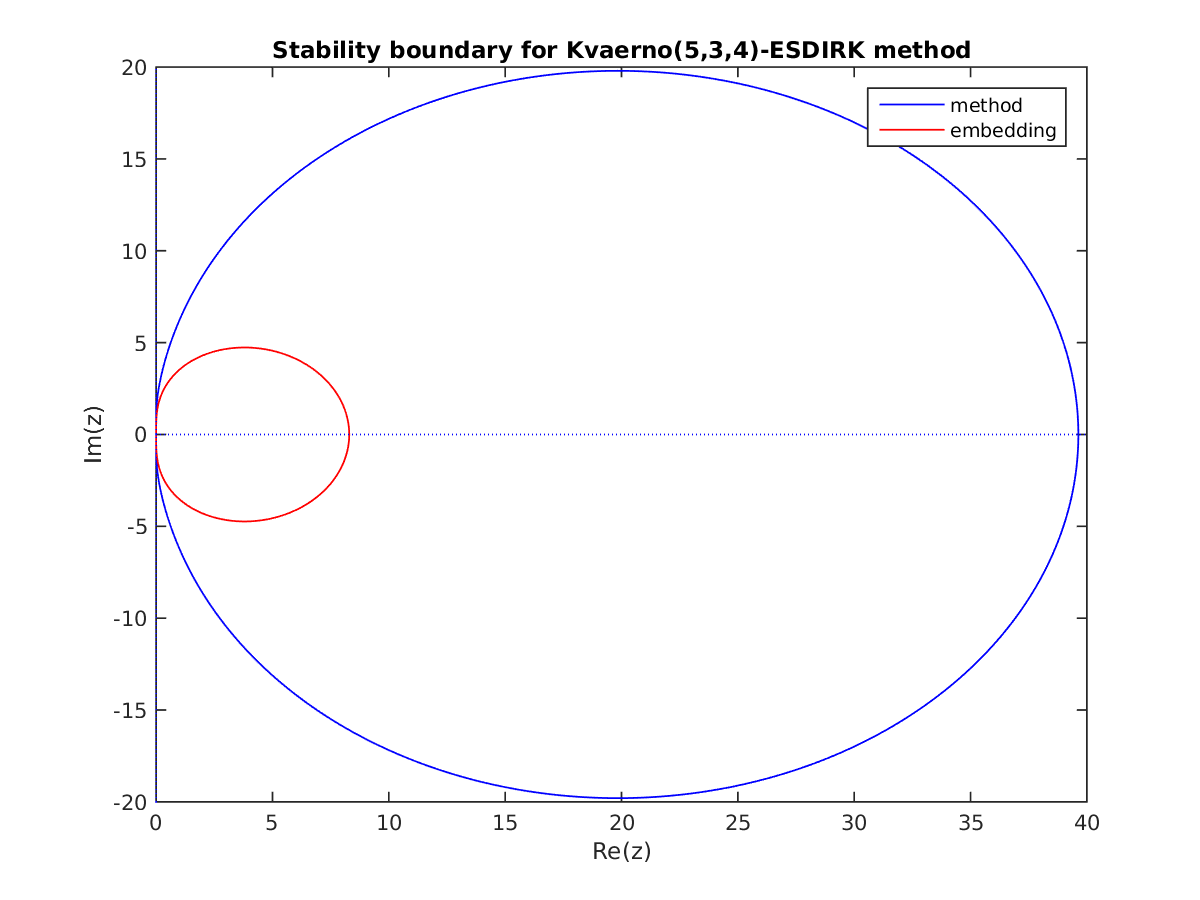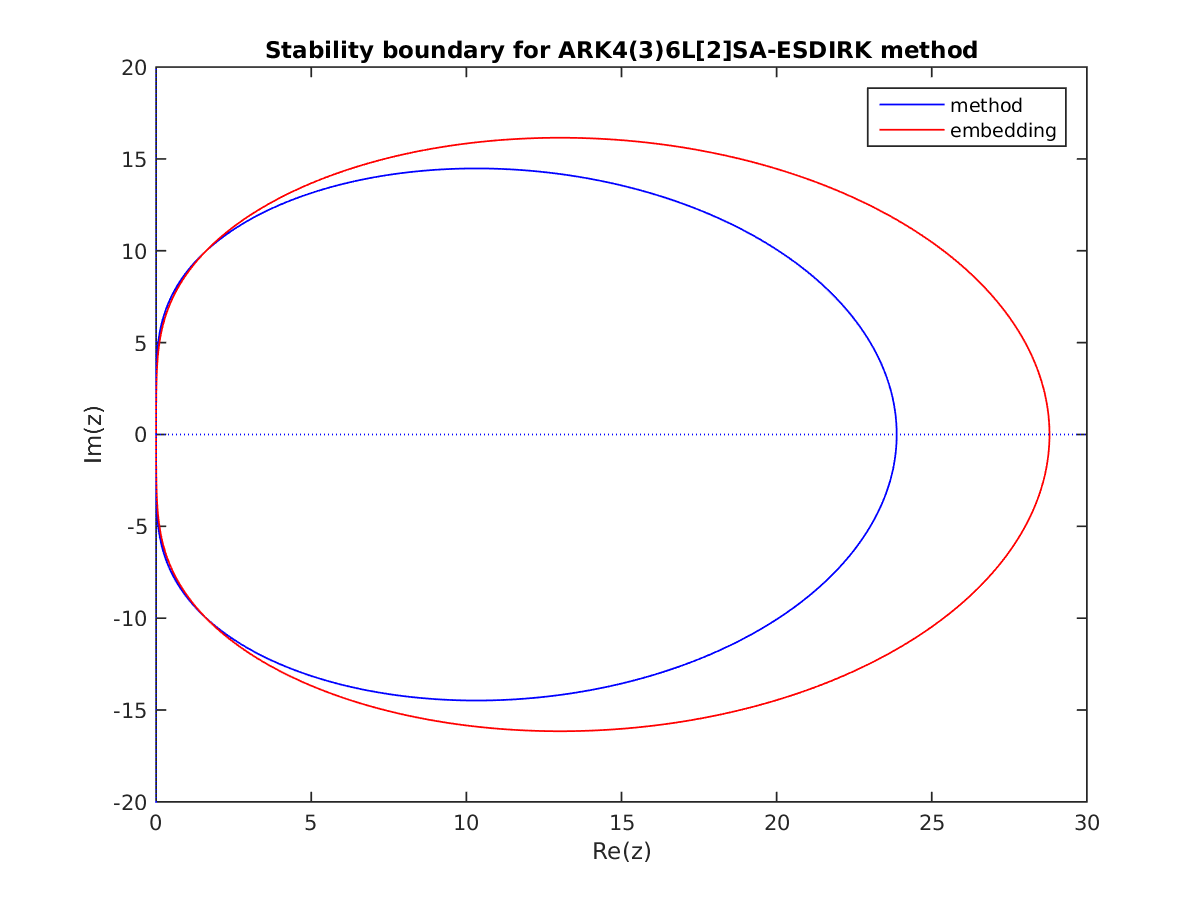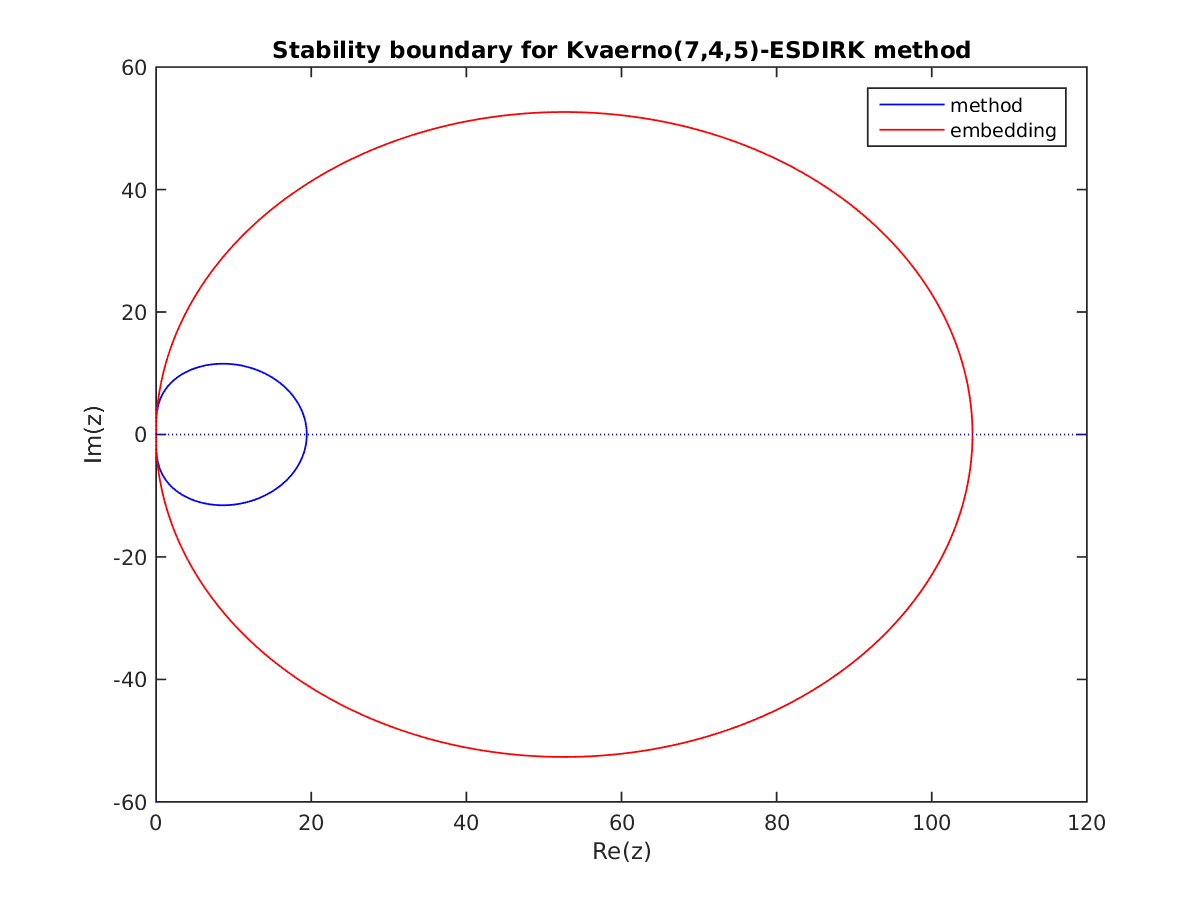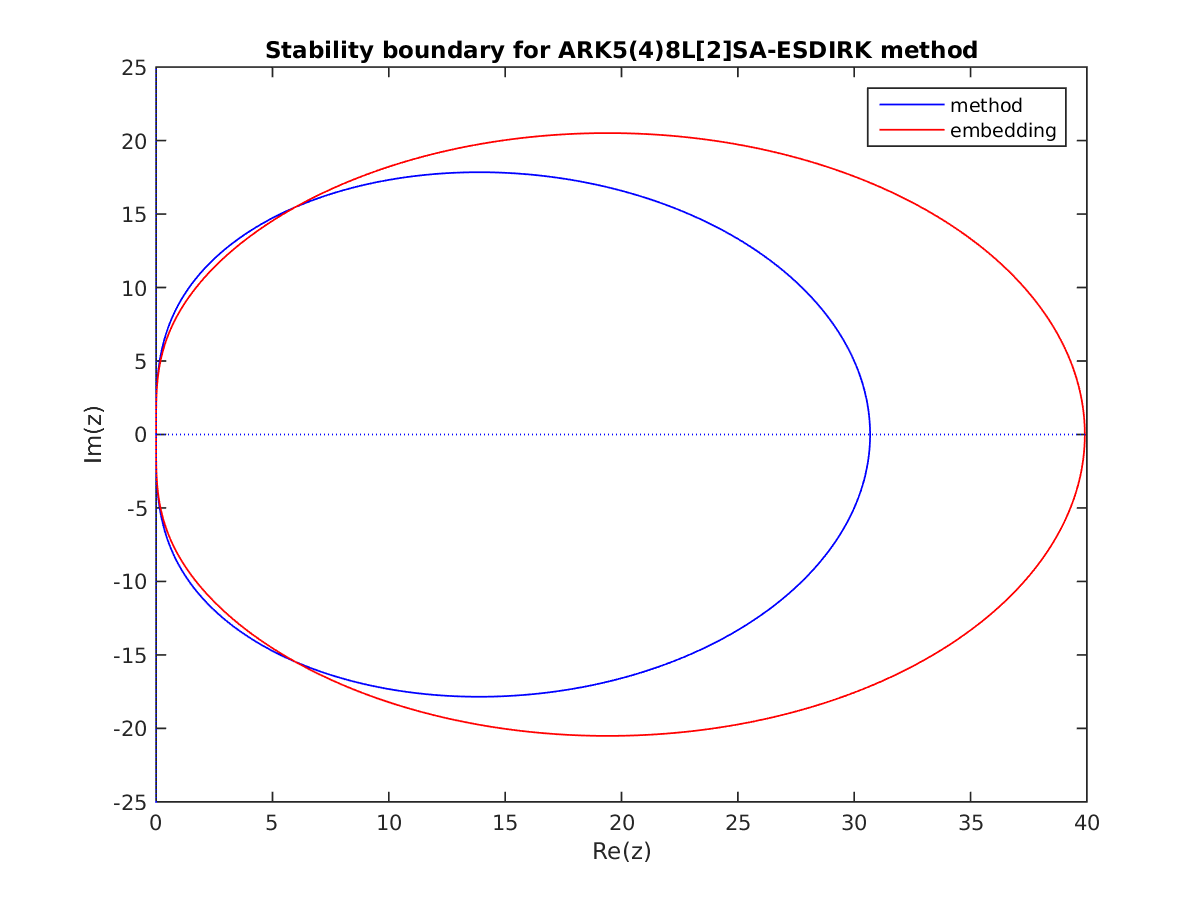3.7. Appendix: Butcher tablesHere we catalog the full set of Butcher tables included in ARKODE.
We group these into three categories: explicit , implicit and
additive . However, since the methods that comprise an additive
Runge–Kutta method are themselves explicit and implicit, their
component Butcher tables are listed within their separate
sections, but are referenced together in the additive section.
In each of the following tables, we use the following notation (shown
for a 3-stage method):
\[\begin{split}\begin{array}{r|ccc}
c_1 & a_{1,1} & a_{1,2} & a_{1,3} \\
c_2 & a_{2,1} & a_{2,2} & a_{2,3} \\
c_3 & a_{3,1} & a_{3,2} & a_{3,3} \\
\hline
q & b_1 & b_2 & b_3 \\
p & \tilde{b}_1 & \tilde{b}_2 & \tilde{b}_3
\end{array}\end{split}\]
where here the method and embedding share stage \(A\) and
\(c\) values, but use their stages \(z_i\) differently through
the coefficients \(b\) and \(\tilde{b}\) to generate methods
of orders \(q\) (the main method) and \(p\) (the embedding,
typically \(q = p+1\) , though sometimes this is reversed).
Method authors often use different naming conventions to categorize
their methods. For each of the methods below with an embedding, we follow the
uniform naming convention:
where here
NAME
S
P
Q
For methods without an embedding (e.g., fixed-step methods) P NAME-S-Q
In the code, unique integer IDs are defined inside arkode_butcher_erk.h arkode_butcher_dirk.h fixed width
font
Additionally, for each method we provide a plot of the linear
stability region in the complex plane. These have been computed via
the following approach. For any Runge–Kutta method as defined above,
we may define the stability function
\[R(\eta) = 1 + \eta b [I - \eta A]^{-1} e,\]
where \(e\in\mathbb{R}^s\) is a column vector of all ones, \(\eta =
h\lambda\) and \(h\) is the time step size. If the stability
function satisfies \(|R(\eta)| \le 1\) for all eigenvalues,
\(\lambda\) , of \(\frac{\partial }{\partial y}f(t,y)\) for a
given IVP, then the method will be linearly stable for that problem
and step size. The stability region
\[S = \{ \eta\in\mathbb{C}\; :\; \left| R(\eta) \right| \le 1\}\]
is typically given by an enclosed region of the complex plane, so it
is standard to search for the border of that region in order to
understand the method. Since all complex numbers with unit magnitude
may be written as \(e^{i\theta}\) for some value of \(\theta\) ,
we perform the following algorithm to trace out this boundary.
Define an array of values Theta \(16\pi\) .
Since some angles will correspond to multiple locations on the
stability boundary, by going beyond \(2\pi\) we ensure that all
boundary locations are plotted, and by using such a fine
discretization the Newton method (next step) is more likely to
converge to the root closest to the previous boundary point,
ensuring a smooth plot.
For each value \(\theta \in\) Theta
\[0 = f(\eta) = R(\eta) - e^{i\theta}\]
using a finite-difference Newton iteration, using tolerance
\(10^{-7}\) , and differencing parameter
\(\sqrt{\varepsilon}\) (\(\approx 10^{-8}\) ).
In this iteration, we use as initial guess the solution from the
previous value of \(\theta\) , starting with an initial-initial
guess of \(\eta=0\) for \(\theta=0\) .
We then plot the resulting \(\eta\) values that trace the
stability region boundary.
We note that for any stable IVP method, the value \(\eta_0 =
-\varepsilon + 0i\) is always within the stability region. So in each
of the following pictures, the interior of the stability region is the
connected region that includes \(\eta_0\) . Resultingly, methods
whose linear stability boundary is located entirely in the right
half-plane indicate an A-stable method.
3.7.1. Explicit Butcher tablesIn the category of explicit Runge–Kutta methods, ARKODE includes
methods that have orders 2 through 6, with embeddings that are of
orders 1 through 5. Each of ARKODE’s explicit Butcher tables are
specified via a unique ID:
enum ARKODE_ERKTableID
with values specified for each method below (e.g., ARKODE_HEUN_EULER_2_1_2
3.7.1.1. Heun-Euler-2-1-2Accessible via the constant ARKODE_HEUN_EULER_2_1_2 ARKStepSetTableNum() ERKStepSetTableNum() ARKodeButcherTable_LoadERK()
\[\begin{split}\renewcommand{\arraystretch}{1.5}
\begin{array}{r|cc}
0 & 0 & 0 \\
1 & 1 & 0 \\
\hline
2 & \frac{1}{2} & \frac{1}{2} \\
1 & 1 & 0
\end{array}\end{split}\]
Fig. 3.4 Linear stability region for the Heun-Euler method. The method’s
region is outlined in blue; the embedding’s region is in red.
3.7.1.2. Bogacki-Shampine-4-2-3Accessible via the constant ARKODE_BOGACKI_SHAMPINE_4_2_3 ARKStepSetTableNum() ERKStepSetTableNum() ARKodeButcherTable_LoadERK() [8 ] ).
\[\begin{split}\renewcommand{\arraystretch}{1.5}
\begin{array}{r|cccc}
0 & 0 & 0 & 0 & 0 \\
\frac{1}{2} & \frac{1}{2} & 0 & 0 & 0 \\
\frac{3}{4} & 0 & \frac{3}{4} & 0 & 0 \\
1 & \frac{2}{9} & \frac{1}{3} & \frac{4}{9} & 0 \\
\hline
3 & \frac{2}{9} & \frac{1}{3} & \frac{4}{9} \\
2 & \frac{7}{24} & \frac{1}{4} & \frac{1}{3} & \frac{1}{8}
\end{array}\end{split}\]
Fig. 3.5 Linear stability region for the Bogacki-Shampine method. The method’s
region is outlined in blue; the embedding’s region is in red.
3.7.1.3. ARK-4-2-3 (explicit)Accessible via the constant ARKODE_ARK324L2SA_ERK_4_2_3 ARKStepSetTableNum() ERKStepSetTableNum() ARKodeButcherTable_LoadERK() [62 ] ).
\[\begin{split}\renewcommand{\arraystretch}{1.5}
\begin{array}{r|cccc}
0 & 0 & 0 & 0 & 0 \\
\frac{1767732205903}{2027836641118} & \frac{1767732205903}{2027836641118} & 0 & 0 & 0 \\
\frac{3}{5} & \frac{5535828885825}{10492691773637} & \frac{788022342437}{10882634858940} & 0 & 0 \\
1 & \frac{6485989280629}{16251701735622} & -\frac{4246266847089}{9704473918619} & \frac{10755448449292}{10357097424841} & 0 \\
\hline
3 & \frac{1471266399579}{7840856788654} & -\frac{4482444167858}{7529755066697} & \frac{11266239266428}{11593286722821} & \frac{1767732205903}{4055673282236} \\
2 & \frac{2756255671327}{12835298489170} & -\frac{10771552573575}{22201958757719} & \frac{9247589265047}{10645013368117} & \frac{2193209047091}{5459859503100}
\end{array}\end{split}\]
Fig. 3.6 Linear stability region for the explicit ARK-4-2-3 method. The method’s
region is outlined in blue; the embedding’s region is in red.
3.7.1.4. Knoth-Wolke-3-3Accessible via the constant ARKODE_KNOTH_WOLKE_3_3 MRIStepSetMRITableNum() ARKodeButcherTable_LoadERK() [64 ] ).
\[\begin{split}\renewcommand{\arraystretch}{1.5}
\begin{array}{r|ccc}
0 & 0 & 0 & 0 \\
\frac{1}{3} & \frac{1}{3} & 0 & 0 \\
\frac{3}{4} & -\frac{3}{16} & \frac{15}{16} & 0 \\
\hline
3 & \frac{1}{6} & \frac{3}{10} & \frac{8}{15}
\end{array}\end{split}\]
Fig. 3.7 Linear stability region for the Knoth-Wolke method
3.7.1.5. Zonneveld-5-3-4Accessible via the constant ARKODE_ZONNEVELD_5_3_4 ARKStepSetTableNum() ERKStepSetTableNum() ARKodeButcherTable_LoadERK() [95 ] ).
\[\begin{split}\renewcommand{\arraystretch}{1.5}
\begin{array}{r|ccccc}
0 & 0 & 0 & 0 & 0 & 0 \\
\frac{1}{2} & \frac{1}{2} & 0 & 0 & 0 & 0 \\
\frac{1}{2} & 0 & \frac{1}{2} & 0 & 0 & 0 \\
1 & 0 & 0 & 1 & 0 & 0 \\
\frac{3}{4} & \frac{5}{32} & \frac{7}{32} & \frac{13}{32} & -\frac{1}{32} & 0 \\
\hline
4 & \frac{1}{6} & \frac{1}{3} & \frac{1}{3} & \frac{1}{6} & 0 \\
3 & -\frac{1}{2} & \frac{7}{3} & \frac{7}{3} & \frac{13}{6} & -\frac{16}{3}
\end{array}\end{split}\]
Fig. 3.8 Linear stability region for the Zonneveld method. The method’s
region is outlined in blue; the embedding’s region is in red.
3.7.1.6. ARK-6-3-4 (explicit)Accessible via the constant ARKODE_ARK436L2SA_ERK_6_3_4 ARKStepSetTableNum() ERKStepSetTableNum() ARKodeButcherTable_LoadERK() [62 ] ).
\[\begin{split}\renewcommand{\arraystretch}{1.5}
\begin{array}{r|cccccc}
0 & 0 & 0 & 0 & 0 & 0 & 0 \\
\frac12 & \frac12 & 0 & 0 & 0 & 0 & 0 \\
\frac{83}{250} & \frac{13861}{62500} & \frac{6889}{62500} & 0 & 0 & 0 & 0 \\
\frac{31}{50} & -\frac{116923316275}{2393684061468} & -\frac{2731218467317}{15368042101831} & \frac{9408046702089}{11113171139209} & 0 & 0 & 0 \\
\frac{17}{20} & -\frac{451086348788}{2902428689909} & -\frac{2682348792572}{7519795681897} & \frac{12662868775082}{11960479115383} & \frac{3355817975965}{11060851509271} & 0 & 0 \\
1 & \frac{647845179188}{3216320057751} & \frac{73281519250}{8382639484533} & \frac{552539513391}{3454668386233} & \frac{3354512671639}{8306763924573} & \frac{4040}{17871} & 0 \\
\hline
4 & \frac{82889}{524892} & 0 & \frac{15625}{83664} & \frac{69875}{102672} & -\frac{2260}{8211} & \frac14 \\
3 & \frac{4586570599}{29645900160} & 0 & \frac{178811875}{945068544} & \frac{814220225}{1159782912} & -\frac{3700637}{11593932} & \frac{61727}{225920}
\end{array}\end{split}\]
Fig. 3.9 Linear stability region for the explicit ARK-6-3-4 method. The method’s
region is outlined in blue; the embedding’s region is in red.
3.7.1.7. ARK-7-3-4 (explicit)Accessible via the constant ARKODE_ARK437L2SA_ERK_7_3_4 ARKStepSetTableNum() ERKStepSetTableNum() ARKodeButcherTable_LoadERK() [63 ] ).
\[\begin{split}\renewcommand{\arraystretch}{1.5}
\begin{array}{r|ccccccc}
0 & 0 & 0 & 0 & 0 & 0 & 0 & 0 \\
\frac{247}{1000} & \frac{247}{1000} & 0 & 0 & 0 & 0 & 0 & 0 \\
\frac{4276536705230}{10142255878289} & \frac{247}{4000} & \frac{2694949928731}{7487940209513} & 0 & 0 & 0 & 0 & 0 \\
\frac{67}{200} & \frac{464650059369}{8764239774964} & \frac{878889893998}{2444806327765} & -\frac{952945855348}{12294611323341} & 0 & 0 & 0 & 0 \\
\frac{3}{40} & \frac{476636172619}{8159180917465} & -\frac{1271469283451}{7793814740893} & -\frac{859560642026}{4356155882851} & \frac{1723805262919}{4571918432560} & 0 & 0 & 0 \\
\frac{7}{10} & \frac{6338158500785}{11769362343261} & -\frac{4970555480458}{10924838743837} & \frac{3326578051521}{2647936831840} & -\frac{880713585975}{1841400956686} & -\frac{1428733748635}{8843423958496} & 0 & 0 \\
1 & \frac{760814592956}{3276306540349} & \frac{760814592956}{3276306540349} & -\frac{47223648122716}{6934462133451} & \frac{71187472546993}{9669769126921} & -\frac{13330509492149}{9695768672337} & \frac{11565764226357}{8513123442827} & 0 \\
\hline
4 & 0 & 0 & \frac{9164257142617}{17756377923965} & -\frac{10812980402763}{74029279521829} & \frac{1335994250573}{5691609445217} & \frac{2273837961795}{8368240463276} & \frac{247}{2000} \\
3 & 0 & 0 & \frac{4469248916618}{8635866897933} & -\frac{621260224600}{4094290005349} & \frac{696572312987}{2942599194819} & \frac{1532940081127}{5565293938103} & \frac{2441}{20000}
\end{array}\end{split}\]
3.7.1.8. Sayfy-Aburub-6-3-4Accessible via the constant ARKODE_SAYFY_ABURUB_6_3_4 ARKStepSetTableNum() ERKStepSetTableNum() ARKodeButcherTable_LoadERK() [79 ] ).
\[\begin{split}\renewcommand{\arraystretch}{1.5}
\begin{array}{r|cccccc}
0 & 0 & 0 & 0 & 0 & 0 & 0 \\
\frac{1}{2} & \frac{1}{2} & 0 & 0 & 0 & 0 & 0 \\
1 & -1 & 2 & 0 & 0 & 0 & 0 \\
1 & \frac{1}{6} & \frac{2}{3} & \frac{1}{6} & 0 & 0 & 0 \\
\frac{1}{2} & 0.137 & 0.226 & 0.137 & 0 & 0 & 0 \\
1 & 0.452 & -0.904 & -0.548 & 0 & 2 & 0 \\
\hline
4 & \frac{1}{6} & \frac{1}{3} & \frac{1}{12} & 0 & \frac{1}{3} & \frac{1}{12} \\
3 & \frac{1}{6} & \frac{2}{3} & \frac{1}{6} & 0 & 0 & 0
\end{array}\end{split}\]
Fig. 3.10 Linear stability region for the Sayfy-Aburub-6-3-4 method. The method’s
region is outlined in blue; the embedding’s region is in red.
3.7.1.9. Cash-Karp-6-4-5Accessible via the constant ARKODE_CASH_KARP_6_4_5 ARKStepSetTableNum() ERKStepSetTableNum() ARKodeButcherTable_LoadERK() [24 ] ).
\[\begin{split}\renewcommand{\arraystretch}{1.5}
\begin{array}{r|cccccc}
0 & 0 & 0 & 0 & 0 & 0 & 0 \\
\frac{1}{5} & \frac{1}{5} & 0 & 0 & 0 & 0 & 0 \\
\frac{3}{10} & \frac{3}{40} & \frac{9}{40} & 0 & 0 & 0 & 0 \\
\frac{3}{5} & \frac{3}{10} & -\frac{9}{10} & \frac{6}{5} & 0 & 0 & 0 \\
1 & -\frac{11}{54} & \frac{5}{2} & -\frac{70}{27} & \frac{35}{27} & 0 & 0 \\
\frac{7}{8} & \frac{1631}{55296} & \frac{175}{512} & \frac{575}{13824} & \frac{44275}{110592} & \frac{253}{4096} & 0 \\
\hline
5 & \frac{37}{378} & 0 & \frac{250}{621} & \frac{125}{594} & 0 & \frac{512}{1771} \\
4 & \frac{2825}{27648} & 0 & \frac{18575}{48384} & \frac{13525}{55296} & \frac{277}{14336} & \frac{1}{4}
\end{array}\end{split}\]
Fig. 3.11 Linear stability region for the Cash-Karp method. The method’s
region is outlined in blue; the embedding’s region is in red.
3.7.1.10. Fehlberg-6-4-5Accessible via the constant ARKODE_FEHLBERG_6_4_5 ARKStepSetTableNum() ERKStepSetTableNum() ARKodeButcherTable_LoadERK() [41 ] ).
\[\begin{split}\renewcommand{\arraystretch}{1.5}
\begin{array}{r|cccccc}
0 & 0 & 0 & 0 & 0 & 0 & 0 \\
\frac{1}{4} & \frac{1}{4} & 0 & 0 & 0 & 0 & 0 \\
\frac{3}{8} & \frac{3}{32} & \frac{9}{32} & 0 & 0 & 0 & 0 \\
\frac{12}{13} & \frac{1932}{2197} & -\frac{7200}{2197} & \frac{7296}{2197} & 0 & 0 & 0 \\
1 & \frac{439}{216} & -8 & \frac{3680}{513} & -\frac{845}{4104} & 0 & 0 \\
\frac{1}{2} & -\frac{8}{27} & 2 & -\frac{3544}{2565} & \frac{1859}{4104} & -\frac{11}{40} & 0 \\
\hline
5 & \frac{16}{135} & 0 & \frac{6656}{12825} & \frac{28561}{56430} & -\frac{9}{50} & \frac{2}{55} \\
4 & \frac{25}{216} & 0 & \frac{1408}{2565} & \frac{2197}{4104} & -\frac{1}{5} & 0
\end{array}\end{split}\]
Fig. 3.12 Linear stability region for the Fehlberg method. The method’s
region is outlined in blue; the embedding’s region is in red.
3.7.1.11. Dormand-Prince-7-4-5Accessible via the constant ARKODE_DORMAND_PRINCE_7_4_5 ARKStepSetTableNum() ERKStepSetTableNum() ARKodeButcherTable_LoadERK() [34 ] ).
\[\begin{split}\renewcommand{\arraystretch}{1.5}
\begin{array}{r|ccccccc}
0 & 0 & 0 & 0 & 0 & 0 & 0 & 0 \\
\frac{1}{5} & \frac{1}{5} & 0 & 0 & 0 & 0 & 0 & 0 \\
\frac{3}{10} & \frac{3}{40} & \frac{9}{40} & 0 & 0 & 0 & 0 & 0 \\
\frac{4}{5} & \frac{44}{45} & -\frac{56}{15} & \frac{32}{9} & 0 & 0 & 0 & 0 \\
\frac{8}{9} & \frac{19372}{6561} & -\frac{25360}{2187} & \frac{64448}{6561} & -\frac{212}{729} & 0 & 0 & 0 \\
1 & \frac{9017}{3168} & -\frac{355}{33} & \frac{46732}{5247} & \frac{49}{176} & -\frac{5103}{18656} & 0 & 0 \\
1 & \frac{35}{384} & 0 & \frac{500}{1113} & \frac{125}{192} & -\frac{2187}{6784} & \frac{11}{84} & 0 \\
\hline
5 & \frac{35}{384} & 0 & \frac{500}{1113} & \frac{125}{192} & -\frac{2187}{6784} & \frac{11}{84} & 0 \\
4 & \frac{5179}{57600} & 0 & \frac{7571}{16695} & \frac{393}{640} & -\frac{92097}{339200} & \frac{187}{2100} & \frac{1}{40}
\end{array}\end{split}\]
Fig. 3.13 Linear stability region for the Dormand-Prince method. The method’s
region is outlined in blue; the embedding’s region is in red.
3.7.1.12. ARK-8-4-5 (explicit)Accessible via the constant ARKODE_ARK548L2SA_ERK_8_4_5 ARKStepSetTableNum() ERKStepSetTableNum() ARKodeButcherTable_LoadERK() [62 ] ).
\[\begin{split}\renewcommand{\arraystretch}{1.5}
\begin{array}{r|cccccccc}
0 & 0 & 0 & 0 & 0 & 0 & 0 & 0 & 0 \\
\frac{41}{100} & \frac{41}{100} & 0 & 0 & 0 & 0 & 0 & 0 & 0 \\
\frac{2935347310677}{11292855782101} & \frac{367902744464}{2072280473677} & \frac{677623207551}{8224143866563} & 0 & 0 & 0 & 0 & 0 & 0 \\
\frac{1426016391358}{7196633302097} & \frac{1268023523408}{10340822734521} & 0 & \frac{1029933939417}{13636558850479} & 0 & 0 & 0 & 0 & 0 \\
\frac{92}{100} & \frac{14463281900351}{6315353703477} & 0 & \frac{66114435211212}{5879490589093} & -\frac{54053170152839}{4284798021562} & 0 & 0 & 0 & 0 \\
\frac{24}{100} & \frac{14090043504691}{34967701212078} & 0 & \frac{15191511035443}{11219624916014} & -\frac{18461159152457}{12425892160975} & -\frac{281667163811}{9011619295870} & 0 & 0 & 0 \\
\frac{3}{5} & \frac{19230459214898}{13134317526959} & 0 & \frac{21275331358303}{2942455364971} & -\frac{38145345988419}{4862620318723} & -\frac{1}{8} & -\frac{1}{8} & 0 & 0 \\
1 & -\frac{19977161125411}{11928030595625} & 0 & -\frac{40795976796054}{6384907823539} & \frac{177454434618887}{12078138498510} & \frac{782672205425}{8267701900261} & -\frac{69563011059811}{9646580694205} & \frac{7356628210526}{4942186776405} & 0 \\
\hline
5 & -\frac{872700587467}{9133579230613} & 0 & 0 & \frac{22348218063261}{9555858737531} & -\frac{1143369518992}{8141816002931} & -\frac{39379526789629}{19018526304540} & \frac{32727382324388}{42900044865799} & \frac{41}{200} \\
4 & -\frac{975461918565}{9796059967033} & 0 & 0 & \frac{78070527104295}{32432590147079} & -\frac{548382580838}{3424219808633} & -\frac{33438840321285}{15594753105479} & \frac{3629800801594}{4656183773603} & \frac{4035322873751}{18575991585200}
\end{array}\end{split}\]
Fig. 3.14 Linear stability region for the explicit ARK-8-4-5 method. The method’s
region is outlined in blue; the embedding’s region is in red.
3.7.1.13. ARK-8-4-5b (explicit)Accessible via the constant ARKODE_ARK548L2SAb_ERK_8_4_5 ARKStepSetTableNum() ERKStepSetTableNum() ARKodeButcherTable_LoadERK() [63 ] .
\[\begin{split}\renewcommand{\arraystretch}{1.5}
\begin{array}{r|cccccccc}
0 & 0 & 0 & 0 & 0 & 0 & 0 & 0 & 0 \\
\frac{4}{9} & \frac{4}{9} & 0 & 0 & 0 & 0 & 0 & 0 & 0 \\
\frac{6456083330201}{8509243623797} & \frac{1}{9} & \frac{1183333538310}{1827251437969} & 0 & 0 & 0 & 0 & 0 & 0 \\
\frac{1632083962415}{14158861528103} & \frac{895379019517}{9750411845327} & \frac{477606656805}{13473228687314} & \frac{-112564739183}{9373365219272} & 0 & 0 & 0 & 0 & 0 \\
\frac{6365430648612}{17842476412687} & \frac{-4458043123994}{13015289567637} & \frac{-2500665203865}{9342069639922} & \frac{983347055801}{8893519644487} & \frac{2185051477207}{2551468980502} & 0 & 0 & 0 & 0 \\
\frac{18}{25} & \frac{-167316361917}{17121522574472} & \frac{1605541814917}{7619724128744} & \frac{991021770328}{13052792161721} & \frac{2342280609577}{11279663441611} & \frac{3012424348531}{12792462456678} & 0 & 0 & 0 \\
\frac{191}{200} & \frac{6680998715867}{14310383562358} & \frac{5029118570809}{3897454228471} & \frac{2415062538259}{6382199904604} & \frac{-3924368632305}{6964820224454} & \frac{-4331110370267}{15021686902756} & \frac{-3944303808049}{11994238218192} & 0 & 0 \\
1 & \frac{2193717860234}{3570523412979} & \frac{2193717860234}{3570523412979} & \frac{5952760925747}{18750164281544} & \frac{-4412967128996}{6196664114337} & \frac{4151782504231}{36106512998704} & \frac{572599549169}{6265429158920} & \frac{-457874356192}{11306498036315} & 0 \\
\hline
5 & 0 & 0 & \frac{3517720773327}{20256071687669} & \frac{4569610470461}{17934693873752} & \frac{2819471173109}{11655438449929} & \frac{3296210113763}{10722700128969} & \frac{-1142099968913}{5710983926999} & \frac{2}{9} \\
4 & 0 & 0 & \frac{520639020421}{8300446712847} & \frac{4550235134915}{17827758688493} & \frac{1482366381361}{6201654941325} & \frac{5551607622171}{13911031047899} & \frac{-5266607656330}{36788968843917} & \frac{1074053359553}{5740751784926}
\end{array}\end{split}\]
3.7.1.14. Verner-8-5-6Accessible via the constant ARKODE_VERNER_8_5_6 ARKStepSetTableNum() ERKStepSetTableNum() ARKodeButcherTable_LoadERK() [92 ] ).
\[\begin{split}\renewcommand{\arraystretch}{1.5}
\begin{array}{r|cccccccc}
0 & 0 & 0 & 0 & 0 & 0 & 0 & 0 & 0 \\
\frac{1}{6} & \frac{1}{6} & 0 & 0 & 0 & 0 & 0 & 0 & 0 \\
\frac{4}{15} & \frac{4}{75} & \frac{16}{75} & 0 & 0 & 0 & 0 & 0 & 0 \\
\frac{2}{3} & \frac{5}{6} & -\frac{8}{3} & \frac{5}{2} & 0 & 0 & 0 & 0 & 0 \\
\frac{5}{6} & -\frac{165}{64} & \frac{55}{6} & -\frac{425}{64} & \frac{85}{96} & 0 & 0 & 0 & 0 \\
1 & \frac{12}{5} & -8 & \frac{4015}{612} & -\frac{11}{36} & \frac{88}{255} & 0 & 0 & 0 \\
\frac{1}{15} & -\frac{8263}{15000} & \frac{124}{75} & -\frac{643}{680} & -\frac{81}{250} & \frac{2484}{10625} & 0 & 0 & 0 \\
1 & \frac{3501}{1720} & -\frac{300}{43} & \frac{297275}{52632} & -\frac{319}{2322} & \frac{24068}{84065} & 0 & \frac{3850}{26703} & 0 \\
\hline
6 & \frac{3}{40} & 0 & \frac{875}{2244} & \frac{23}{72} & \frac{264}{1955} & 0 & \frac{125}{11592} & \frac{43}{616} \\
5 & \frac{13}{160} & 0 & \frac{2375}{5984} & \frac{5}{16} & \frac{12}{85} & \frac{3}{44} & 0 & 0
\end{array}\end{split}\]
Fig. 3.15 Linear stability region for the Verner-8-5-6 method. The method’s
region is outlined in blue; the embedding’s region is in red.
3.7.1.15. Fehlberg-13-7-8Accessible via the constant ARKODE_FEHLBERG_13_7_8 ARKStepSetTableNum() ERKStepSetTableNum() ARKodeButcherTable_LoadERK() [16 ] ).
\[\begin{split}\renewcommand{\arraystretch}{1.5}
\begin{array}{r|ccccccccccccc}
0& 0& 0& 0& 0& 0& 0& 0& 0& 0& 0& 0& 0& 0\\
\frac{2}{27}& \frac{2}{27}& 0& 0& 0& 0& 0& 0& 0& 0& 0& 0& 0& 0\\
\frac{1}{9}& \frac{1}{36}& \frac{1}{12}& 0& 0& 0& 0& 0& 0& 0& 0& 0& 0& 0\\
\frac{1}{6}& \frac{1}{24}& 0& \frac{1}{8}& 0& 0& 0& 0& 0& 0& 0& 0& 0& 0\\
\frac{5}{12}& \frac{5}{12}& 0& -\frac{25}{16}& \frac{25}{16}& 0& 0& 0& 0& 0& 0& 0& 0& 0\\
\frac{1}{2}& \frac{1}{20}& 0& 0& \frac{1}{4}& \frac{1}{5}& 0& 0& 0& 0& 0& 0& 0& 0\\
\frac{5}{6}& -\frac{25}{108}& 0& 0& \frac{125}{108}& -\frac{65}{27}& \frac{125}{54}& 0& 0& 0& 0& 0& 0& 0\\
\frac{1}{6}& \frac{31}{300}& 0& 0& 0& \frac{61}{225}& -\frac{2}{9}& \frac{13}{900}& 0& 0& 0& 0& 0& 0\\
\frac{2}{3}& 2& 0& 0& -\frac{53}{6}& \frac{704}{45}& -\frac{107}{9}& \frac{67}{90}& 3& 0& 0& 0& 0& 0\\
\frac{1}{3}& -\frac{91}{108}& 0& 0& \frac{23}{108}& -\frac{976}{135}& \frac{311}{54}& -\frac{19}{60}& \frac{17}{6}& -\frac{1}{12}& 0& 0& 0& 0\\
1& \frac{2383}{4100}& 0& 0& -\frac{341}{164}& \frac{4496}{1025}& -\frac{301}{82}& \frac{2133}{4100}& \frac{45}{82}& \frac{45}{164}& \frac{18}{41}& 0& 0& 0\\
0& \frac{3}{205}& 0& 0& 0& 0& -\frac{6}{41}& -\frac{3}{205}& -\frac{3}{41}& \frac{3}{41}& \frac{6}{41}& 0& 0& 0\\
1& -\frac{1777}{4100}& 0& 0& -\frac{341}{164}& \frac{4496}{1025}& -\frac{289}{82}& \frac{2193}{4100}& \frac{51}{82}& \frac{33}{164}& \frac{12}{41}& 0& 1& 0\\
\hline
8& 0& 0& 0& 0& 0& \frac{34}{105}& \frac{9}{35}& \frac{9}{35}& \frac{9}{280}& \frac{9}{280}& 0& \frac{41}{840}& \frac{41}{840} \\
7& \frac{41}{840}& 0& 0& 0& 0& \frac{34}{105}& \frac{9}{35}& \frac{9}{35}& \frac{9}{280}& \frac{9}{280}& \frac{41}{840}& 0& 0
\end{array}\end{split}\]
Fig. 3.16 Linear stability region for the Fehlberg-13-7-8 method. The method’s
region is outlined in blue; the embedding’s region is in red.
3.7.2. Implicit Butcher tablesIn the category of diagonally implicit Runge–Kutta methods, ARKODE
includes methods that have orders 2 through 5, with embeddings that are of
orders 1 through 4.
Each of ARKODE’s diagonally-implicit Butcher tables are
specified via a unique ID:
enum ARKODE_DIRKTableID
with values specified for each method below (e.g., ARKODE_SDIRK_2_1_2
3.7.2.1. SDIRK-2-1-2Accessible via the constant ARKODE_SDIRK_2_1_2 ARKStepSetTableNum() ARKodeButcherTable_LoadDIRK()
\[\begin{split}\renewcommand{\arraystretch}{1.5}
\begin{array}{r|cc}
1 & 1 & 0 \\
0 & -1 & 1 \\
\hline
2 & \frac{1}{2} & \frac{1}{2} \\
1 & 1 & 0
\end{array}\end{split}\]
Fig. 3.17 Linear stability region for the SDIRK-2-1-2 method. The method’s
region is outlined in blue; the embedding’s region is in red.
3.7.2.2. Billington-3-3-2Accessible via the constant ARKODE_BILLINGTON_3_3_2 ARKStepSetTableNum() ARKodeButcherTable_LoadDIRK() [6 ] ).
\[\begin{split}\renewcommand{\arraystretch}{1.5}
\begin{array}{r|ccc}
0.292893218813 & 0.292893218813 & 0 & 0 \\
1.091883092037 & 0.798989873223 & 0.292893218813 & 0 \\
1.292893218813 & 0.740789228841 & 0.259210771159 & 0.292893218813 \\
\hline
2 & 0.740789228840 & 0.259210771159 & 0 \\
3 & 0.691665115992 & 0.503597029883 & -0.195262145876
\end{array}\end{split}\]
Fig. 3.18 Linear stability region for the Billington method. The method’s
region is outlined in blue; the embedding’s region is in red.
3.7.2.3. TRBDF2-3-3-2Accessible via the constant ARKODE_TRBDF2_3_3_2 ARKStepSetTableNum() ARKodeButcherTable_LoadDIRK() [5 ] ).
\[\begin{split}\renewcommand{\arraystretch}{1.5}
\begin{array}{r|ccc}
0 & 0 & 0 & 0 \\
2-\sqrt{2} & \frac{2-\sqrt{2}}{2} & \frac{2-\sqrt{2}}{2} & 0 \\
1 & \frac{\sqrt{2}}{4} & \frac{\sqrt{2}}{4} & \frac{2-\sqrt{2}}{2} \\
\hline
2 & \frac{\sqrt{2}}{4} & \frac{\sqrt{2}}{4} & \frac{2-\sqrt{2}}{2} \\
3 & \frac{1-\frac{\sqrt{2}}{4}}{3} & \frac{\frac{3\sqrt{2}}{4}+1}{3} & \frac{2-\sqrt{2}}{6}
\end{array}\end{split}\]
Fig. 3.19 Linear stability region for the TRBDF2 method. The method’s
region is outlined in blue; the embedding’s region is in red.
3.7.2.4. Kvaerno-4-2-3Accessible via the constant ARKODE_KVAERNO_4_2_3 ARKStepSetTableNum() ARKodeButcherTable_LoadDIRK() [65 ] ).
\[\begin{split}\renewcommand{\arraystretch}{1.5}
\begin{array}{r|cccc}
0 & 0 & 0 & 0 & 0 \\
0.871733043 & 0.4358665215 & 0.4358665215 & 0 & 0 \\
1 & 0.490563388419108 & 0.073570090080892 & 0.4358665215 & 0 \\
1 & 0.308809969973036 & 1.490563388254106 & -1.235239879727145 & 0.4358665215 \\
\hline
3 & 0.308809969973036 & 1.490563388254106 & -1.235239879727145 & 0.4358665215 \\
2 & 0.490563388419108 & 0.073570090080892 & 0.4358665215 & 0
\end{array}\end{split}\]
Fig. 3.20 Linear stability region for the Kvaerno-4-2-3 method. The method’s
region is outlined in blue; the embedding’s region is in red.
3.7.2.5. ARK-4-2-3 (implicit)Accessible via the constant ARKODE_ARK324L2SA_DIRK_4_2_3 ARKStepSetTableNum() ARKodeButcherTable_LoadDIRK() [62 ] ).
\[\begin{split}\renewcommand{\arraystretch}{1.5}
\begin{array}{r|cccc}
0 & 0 & 0 & 0 & 0 \\
\frac{1767732205903}{2027836641118} & \frac{1767732205903}{4055673282236} & \frac{1767732205903}{4055673282236} & 0 & 0 \\
\frac{3}{5} & \frac{2746238789719}{10658868560708} & -\frac{640167445237}{6845629431997} & \frac{1767732205903}{4055673282236} & 0 \\
1 & \frac{1471266399579}{7840856788654} & -\frac{4482444167858}{7529755066697} & \frac{11266239266428}{11593286722821} & \frac{1767732205903}{4055673282236} \\
\hline
3 & \frac{1471266399579}{7840856788654} & -\frac{4482444167858}{7529755066697} & \frac{11266239266428}{11593286722821} & \frac{1767732205903}{4055673282236} \\
2 & \frac{2756255671327}{12835298489170} & -\frac{10771552573575}{22201958757719} & \frac{9247589265047}{10645013368117} & \frac{2193209047091}{5459859503100}
\end{array}\end{split}\]
Fig. 3.21 Linear stability region for the implicit ARK-4-2-3 method. The method’s
region is outlined in blue; the embedding’s region is in red.
3.7.2.6. Cash-5-2-4Accessible via the constant ARKODE_CASH_5_2_4 ARKStepSetTableNum() ARKodeButcherTable_LoadDIRK() [23 ] ).
\[\begin{split}\renewcommand{\arraystretch}{1.5}
\begin{array}{r|ccccc}
0.435866521508 & 0.435866521508 & 0 & 0 & 0 & 0 \\
-0.7 & -1.13586652150 & 0.435866521508 & 0 & 0 & 0 \\
0.8 & 1.08543330679 & -0.721299828287 & 0.435866521508 & 0 & 0 \\
0.924556761814 & 0.416349501547 & 0.190984004184 & -0.118643265417 & 0.435866521508 & 0 \\
1 & 0.896869652944 & 0.0182725272734 & -0.0845900310706 & -0.266418670647 & 0.435866521508 \\
\hline
4 & 0.896869652944 & 0.0182725272734 & -0.0845900310706 & -0.266418670647 & 0.435866521508 \\
2 & 1.05646216107052 & -0.0564621610705236 & 0 & 0 & 0
\end{array}\end{split}\]
Fig. 3.22 Linear stability region for the Cash-5-2-4 method. The method’s
region is outlined in blue; the embedding’s region is in red.
3.7.2.7. Cash-5-3-4Accessible via the constant ARKODE_CASH_5_3_4 ARKStepSetTableNum() ARKodeButcherTable_LoadDIRK() [23 ] ).
\[\begin{split}\renewcommand{\arraystretch}{1.5}
\begin{array}{r|ccccc}
0.435866521508 & 0.435866521508 & 0 & 0 & 0 & 0 \\
-0.7 & -1.13586652150 & 0.435866521508 & 0 & 0 & 0 \\
0.8 & 1.08543330679 & -0.721299828287 & 0.435866521508 & 0 & 0 \\
0.924556761814 & 0.416349501547 & 0.190984004184 & -0.118643265417 & 0.435866521508 & 0 \\
1 & 0.896869652944 & 0.0182725272734 & -0.0845900310706 & -0.266418670647 & 0.435866521508 \\
\hline
4 & 0.896869652944 & 0.0182725272734 & -0.0845900310706 & -0.266418670647 & 0.435866521508 \\
3 & 0.776691932910 & 0.0297472791484 & -0.0267440239074 & 0.220304811849 & 0
\end{array}\end{split}\]
Fig. 3.23 Linear stability region for the Cash-5-3-4 method. The method’s
region is outlined in blue; the embedding’s region is in red.
3.7.2.8. SDIRK-5-3-4Accessible via the constant ARKODE_SDIRK_5_3_4 ARKStepSetTableNum() ARKodeButcherTable_LoadDIRK() [47 ] ).
\[\begin{split}\renewcommand{\arraystretch}{1.5}
\begin{array}{r|ccccc}
\frac{1}{4} & \frac{1}{4} & 0 & 0 & 0 & 0 \\
\frac{3}{4} & \frac{1}{2} & \frac{1}{4} & 0 & 0 & 0 \\
\frac{11}{20} & \frac{17}{50} & -\frac{1}{25} & \frac{1}{4} & 0 & 0 \\
\frac{1}{2} & \frac{371}{1360} & -\frac{137}{2720} & \frac{15}{544} & \frac{1}{4} & 0 \\
1 & \frac{25}{24} & -\frac{49}{48} & \frac{125}{16} & -\frac{85}{12} & \frac{1}{4} \\
\hline
4 & \frac{25}{24} & -\frac{49}{48} & \frac{125}{16} & -\frac{85}{12} & \frac{1}{4} \\
3 & \frac{59}{48} & -\frac{17}{96} & \frac{225}{32} & -\frac{85}{12} & 0
\end{array}\end{split}\]
Fig. 3.24 Linear stability region for the SDIRK-5-3-4 method. The method’s
region is outlined in blue; the embedding’s region is in red.
3.7.2.9. Kvaerno-5-3-4Accessible via the constant ARKODE_KVAERNO_5_3_4 ARKStepSetTableNum() ARKodeButcherTable_LoadDIRK() [65 ] ).
\[\begin{split}\renewcommand{\arraystretch}{1.5}
\begin{array}{r|ccccc}
0 & 0 & 0 & 0 & 0 & 0 \\
0.871733043 & 0.4358665215 & 0.4358665215 & 0 & 0 & 0 \\
0.468238744853136 & 0.140737774731968 & -0.108365551378832 & 0.4358665215 & 0 & 0 \\
1 & 0.102399400616089 & -0.376878452267324 & 0.838612530151233 & 0.4358665215 & 0 \\
1 & 0.157024897860995 & 0.117330441357768 & 0.61667803039168 & -0.326899891110444 & 0.4358665215 \\
\hline
4 & 0.157024897860995 & 0.117330441357768 & 0.61667803039168 & -0.326899891110444 & 0.4358665215 \\
3 & 0.102399400616089 & -0.376878452267324 & 0.838612530151233 & 0.4358665215 & 0
\end{array}\end{split}\]
Fig. 3.25 Linear stability region for the Kvaerno-5-3-4 method. The method’s
region is outlined in blue; the embedding’s region is in red.
3.7.2.10. ARK-6-3-4 (implicit)Accessible via the constant ARKODE_ARK436L2SA_DIRK_6_3_4 ARKStepSetTableNum() ARKodeButcherTable_LoadDIRK() [62 ] ).
\[\begin{split}\renewcommand{\arraystretch}{1.5}
\begin{array}{r|cccccc}
0 & 0 & 0 & 0 & 0 & 0 & 0 \\
\frac{1}{2} & \frac{1}{4} & \frac{1}{4} & 0 & 0 & 0 & 0 \\
\frac{83}{250} & \frac{8611}{62500} & -\frac{1743}{31250} & \frac{1}{4} & 0 & 0 & 0 \\
\frac{31}{50} & \frac{5012029}{34652500} & -\frac{654441}{2922500} & \frac{174375}{388108} & \frac{1}{4} & 0 & 0 \\
\frac{17}{20} & \frac{15267082809}{155376265600} & -\frac{71443401}{120774400} & \frac{730878875}{902184768} & \frac{2285395}{8070912} & \frac{1}{4} & 0 \\
1 & \frac{82889}{524892} & 0 & \frac{15625}{83664} & \frac{69875}{102672} & -\frac{2260}{8211} & \frac{1}{4} \\
\hline
4 & \frac{82889}{524892} & 0 & \frac{15625}{83664} & \frac{69875}{102672} & -\frac{2260}{8211} & \frac{1}{4} \\
3 & \frac{4586570599}{29645900160} & 0 & \frac{178811875}{945068544} & \frac{814220225}{1159782912} & -\frac{3700637}{11593932} & \frac{61727}{225920}
\end{array}\end{split}\]
Fig. 3.26 Linear stability region for the implicit ARK-6-3-4 method. The method’s
region is outlined in blue; the embedding’s region is in red.
3.7.2.11. ARK-7-3-4 (implicit)Accessible via the constant ARKODE_ARK437L2SA_DIRK_7_3_4 ARKStepSetTableNum() ARKodeButcherTable_LoadDIRK() [63 ] .
\[\begin{split}\renewcommand{\arraystretch}{1.5}
\begin{array}{r|ccccccc}
0 & 0 & 0 & 0 & 0 & 0 & 0 & 0 \\
\frac{247}{1000} & \frac{1235}{10000} & \frac{1235}{10000} & 0 & 0 & 0 & 0 & 0 \\
\frac{4276536705230}{10142255878289} & \frac{624185399699}{4186980696204} & \frac{624185399699}{4186980696204} & \frac{1235}{10000} & 0 & 0 & 0 & 0 \\
\frac{67}{200} & \frac{1258591069120}{10082082980243} & \frac{1258591069120}{10082082980243} & -\frac{322722984531}{8455138723562} & \frac{1235}{10000} & 0 & 0 & 0 \\
\frac{3}{40} & -\frac{436103496990}{5971407786587} & -\frac{436103496990}{5971407786587} & -\frac{2689175662187}{11046760208243} & \frac{4431412449334}{12995360898505} & \frac{1235}{10000} & 0 & 0 \\
\frac{7}{10} & -\frac{2207373168298}{14430576638973} & -\frac{2207373168298}{14430576638973} & \frac{242511121179}{3358618340039} & \frac{3145666661981}{7780404714551} & \frac{5882073923981}{14490790706663} & \frac{1235}{10000} & 0 \\
1 & 0 & 0 & \frac{9164257142617}{17756377923965} & -\frac{10812980402763}{74029279521829} & \frac{1335994250573}{5691609445217} & \frac{2273837961795}{8368240463276} & \frac{1235}{10000} \\
\hline
4 & 0 & 0 & \frac{9164257142617}{17756377923965} & -\frac{10812980402763}{74029279521829} & \frac{1335994250573}{5691609445217} & \frac{2273837961795}{8368240463276} & \frac{1235}{10000} \\
3 & 0 & 0 & \frac{4469248916618}{8635866897933} & -\frac{621260224600}{4094290005349} & \frac{696572312987}{2942599194819} & \frac{1532940081127}{5565293938103} & \frac{2441}{20000}
\end{array}\end{split}\]
3.7.2.12. Kvaerno-7-4-5Accessible via the constant ARKODE_KVAERNO_7_4_5 ARKStepSetTableNum() ARKodeButcherTable_LoadDIRK() [65 ] ).
\[\begin{split}\renewcommand{\arraystretch}{1.5}
\begin{array}{r|ccccccc}
0 & 0 & 0 & 0 & 0 & 0 & 0 & 0 \\
0.52 & 0.26 & 0.26 & 0 & 0 & 0 & 0 & 0 \\
1.230333209967908 & 0.13 & 0.84033320996790809 & 0.26 & 0 & 0 & 0 & 0 \\
0.895765984350076 & 0.22371961478320505 & 0.47675532319799699 & -0.06470895363112615 & 0.26 & 0 & 0 & 0 \\
0.436393609858648 & 0.16648564323248321 & 0.10450018841591720 & 0.03631482272098715 & -0.13090704451073998 & 0.26 & 0 & 0 \\
1 & 0.13855640231268224 & 0 & -0.04245337201752043 & 0.02446657898003141 & 0.61943039072480676 & 0.26 & 0 \\
1 & 0.13659751177640291 & 0 & -0.05496908796538376 & -0.04118626728321046 & 0.62993304899016403 & 0.06962479448202728 & 0.26 \\
\hline
5 & 0.13659751177640291 & 0 & -0.05496908796538376 & -0.04118626728321046 & 0.62993304899016403 & 0.06962479448202728 & 0.26 \\
4 & 0.13855640231268224 & 0 & -0.04245337201752043 & 0.02446657898003141 & 0.61943039072480676 & 0.26 & 0
\end{array}\end{split}\]
Fig. 3.27 Linear stability region for the Kvaerno-7-4-5 method. The method’s
region is outlined in blue; the embedding’s region is in red.
3.7.2.13. ARK-8-4-5 (implicit)Accessible via the constant ARKODE_ARK548L2SA_DIRK_8_4_5 ARKStepSetTableNum() ARKodeButcherTable_LoadDIRK() [62 ] ).
\[\begin{split}\renewcommand{\arraystretch}{1.5}
\begin{array}{r|cccccccc}
0 & 0 & 0 & 0 & 0 & 0 & 0 & 0 & 0 \\
\frac{41}{100} & \frac{41}{200} & \frac{41}{200} & 0 & 0 & 0 & 0 & 0 & 0 \\
\frac{2935347310677}{11292855782101} & \frac{41}{400} & -\frac{567603406766}{11931857230679} & \frac{41}{200} & 0 & 0 & 0 & 0 & 0 \\
\frac{1426016391358}{7196633302097} & \frac{683785636431}{9252920307686} & 0 & -\frac{110385047103}{1367015193373} & \frac{41}{200} & 0 & 0 & 0 & 0 \\
\frac{92}{100} & \frac{3016520224154}{10081342136671} & 0 & \frac{30586259806659}{12414158314087} & -\frac{22760509404356}{11113319521817} & \frac{41}{200} & 0 & 0 & 0 \\
\frac{24}{100} & \frac{218866479029}{1489978393911} & 0 & \frac{638256894668}{5436446318841} & -\frac{1179710474555}{5321154724896} & -\frac{60928119172}{8023461067671} & \frac{41}{200} & 0 & 0 \\
\frac{3}{5} & \frac{1020004230633}{5715676835656} & 0 & \frac{25762820946817}{25263940353407} & -\frac{2161375909145}{9755907335909} & -\frac{211217309593}{5846859502534} & -\frac{4269925059573}{7827059040749} & \frac{41}{200} & 0 \\
1 & -\frac{872700587467}{9133579230613} & 0 & 0 & \frac{22348218063261}{9555858737531} & -\frac{1143369518992}{8141816002931} & -\frac{39379526789629}{19018526304540} & \frac{32727382324388}{42900044865799} & \frac{41}{200} \\
\hline
5 & -\frac{872700587467}{9133579230613} & 0 & 0 & \frac{22348218063261}{9555858737531} & -\frac{1143369518992}{8141816002931} & -\frac{39379526789629}{19018526304540} & \frac{32727382324388}{42900044865799} & \frac{41}{200} \\
4 & -\frac{975461918565}{9796059967033} & 0 & 0 & \frac{78070527104295}{32432590147079} & -\frac{548382580838}{3424219808633} & -\frac{33438840321285}{15594753105479} & \frac{3629800801594}{4656183773603} & \frac{4035322873751}{18575991585200}
\end{array}\end{split}\]
Fig. 3.28 Linear stability region for the implicit ARK-8-4-5 method. The method’s
region is outlined in blue; the embedding’s region is in red.
3.7.2.14. ARK-8-4-5b (implicit)Accessible via the constant ARKODE_ARK548L2SAb_DIRK_8_4_5 ARKStepSetTableNum() ARKodeButcherTable_LoadDIRK() [63 ] .
\[\begin{split}\renewcommand{\arraystretch}{1.5}
\begin{array}{r|cccccccc}
0 & 0 & 0 & 0 & 0 & 0 & 0 & 0 & 0 \\
\frac{4}{9} & \frac{2}{9} & \frac{2}{9} & 0 & 0 & 0 & 0 & 0 & 0 \\
\frac{6456083330201}{8509243623797} & \frac{2366667076620}{8822750406821} & \frac{2366667076620}{8822750406821} & \frac{2}{9} & 0 & 0 & 0 & 0 & 0 \\
\frac{1632083962415}{14158861528103} & -\frac{257962897183}{4451812247028} & -\frac{257962897183}{4451812247028} & \frac{128530224461}{14379561246022} & \frac{2}{9} & 0 & 0 & 0 & 0 \\
\frac{6365430648612}{17842476412687} & -\frac{486229321650}{11227943450093} & -\frac{486229321650}{11227943450093} & -\frac{225633144460}{6633558740617} & \frac{1741320951451}{6824444397158} & \frac{2}{9} & 0 & 0 & 0 \\
\frac{18}{25} & \frac{621307788657}{4714163060173} & \frac{621307788657}{4714163060173} & -\frac{125196015625}{3866852212004} & \frac{940440206406}{7593089888465} & \frac{961109811699}{6734810228204} & \frac{2}{9} & 0 & 0 \\
\frac{191}{200} & \frac{2036305566805}{6583108094622} & \frac{2036305566805}{6583108094622} & -\frac{3039402635899}{4450598839912} & -\frac{1829510709469}{31102090912115} & -\frac{286320471013}{6931253422520} & \frac{8651533662697}{9642993110008} & \frac{2}{9} & 0 \\
1 & 0 & 0 & \frac{3517720773327}{20256071687669} & \frac{4569610470461}{17934693873752} & \frac{2819471173109}{11655438449929} & \frac{3296210113763}{10722700128969} & -\frac{1142099968913}{5710983926999} & \frac{2}{9} \\
\hline
5 & 0 & 0 & \frac{3517720773327}{20256071687669} & \frac{4569610470461}{17934693873752} & \frac{2819471173109}{11655438449929} & \frac{3296210113763}{10722700128969} & -\frac{1142099968913}{5710983926999} & \frac{2}{9} \\
4 & 0 & 0 & \frac{520639020421}{8300446712847} & \frac{4550235134915}{17827758688493} & \frac{1482366381361}{6201654941325} & \frac{5551607622171}{13911031047899} & -\frac{5266607656330}{36788968843917} & \frac{1074053359553}{5740751784926}
\end{array}\end{split}\]
3.7.3. Additive Butcher tablesIn the category of additive Runge–Kutta methods for split implicit and
explicit calculations, ARKODE includes methods that have orders 3
through 5, with embeddings that are of orders 2 through 4. These
Butcher table pairs are as follows:
